

For a city that started as nothing more than a fort on a hill, Edinburgh hasn’t done too badly for itself over the years. If you’re visiting the Scottish capital in 2022, you’ll need some tips on tricks to help you figure out where to go and what to do. This is the essential Edinburgh solo travel guide.
After reading this post, you’ll no longer be wondering “Why should I visit Edinburgh?”, but rather “When can I go to Edinburgh?”
Don’t say I didn’t warn you.
Note: this post includes a free pdf Edinburgh itinerary. Just drop your email below and you’ll get the itinerary sent to your inbox within a few minutes.
Now, before we go any further, take a look at my Edinburgh travel video to find out why the city is one of my favourite solo travel destinations in Europe. (It only takes two minutes to watch and you’ll get a great feel of the city!)
Skip to the next section: How to get to Edinburgh
Before we kick off this Edinburgh solo travel guide, let’s take a look at some essential information about the Scottish capital.
Although it’s not the biggest city in the country — that’s Glasgow — Edinburgh has been the capital of Scotland since at least the 15th century. The city is one of the educational, historical, cultural and financial centres of the United Kingdom.
Skip to the next section: What to do in Edinburgh
There are a few ways to get to Edinburgh, including flights, trains and buses.
For most people travelling to Edinburgh from outside the UK, a flight will be the best option.
Travelling by train to Edinburgh is often the fastest and best value-for-money option for people coming from major cities in the UK, such as Manchester, Newcastle, Glasgow or Liverpool.
Check the National Rail website to find train times and timetables to Edinburgh.
Pro tip: you can save a substantial amount of money by travelling during off-peak times and departing from smaller train stations (e.g. London Euston instead of London Kings Cross).
If you don’t mind spending more time on your way to Edinburgh to save money on transport, a bus or coach is probably your best bet.
Be sure to check companies like National Express, Megabus and Citylink, as well as comparing bus fares on aggregate websites like Wanderu and Busradar.
Honestly, you’ll be able to visit everything you want to visit on foot.
But, just in case you want some more comfort instead of working out (yes, walking around Edinburgh is quite a workout), you can also rely on its excellent bus network.
Still not quite enough comfort for you? You can hail one of the 1000+ black taxis driving around at any time.
Now, let’s get to the meat and potatoes of this Edinburgh solo travel guide.
You’re here because you were wondering what to do in Edinburgh, and I’m here to answer that question for you.
Skip to the next section: Miscellaneous things to do in Edinburgh
Of course, these will be some of the most popular things to do in Edinburgh. In other words, lots of other people will be here.
But that doesn’t make these Edinburgh attractions any less worthy of a visit, right? There’s a reason why all these people decide to visit these places.

This 11th century castle is one of Edinburgh’s most recognisable monuments and was recently voted Scotland’s number one paid-for attraction.
As if seeing the magnificent castle on the hill wasn’t enough, it’s also home to the Crown Jewels of Scotland and the National War Museum of Scotland.
Price: From £11.50 per person.
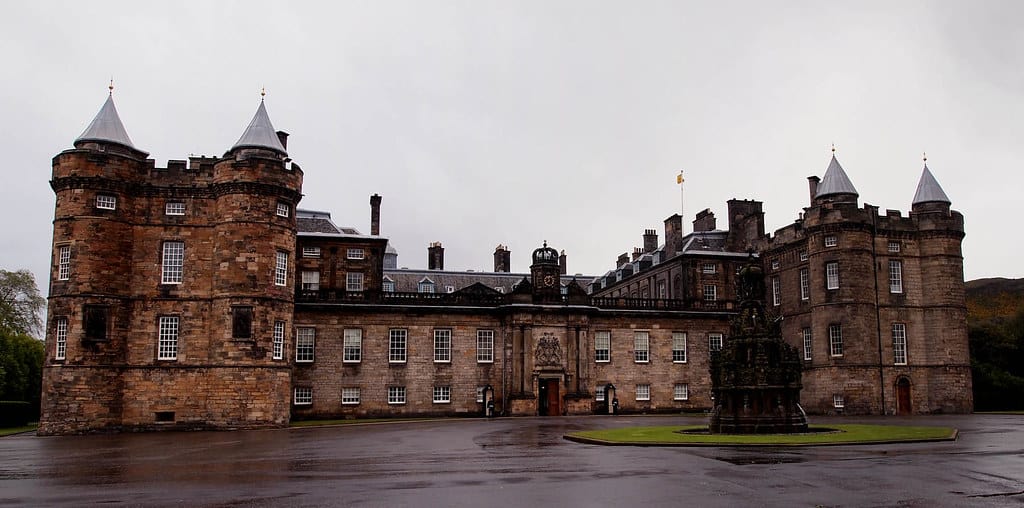
Commonly referred to as Holyrood Palace, this is the official residence of the British monarch (Queen Elizabeth II at the time of writing) in Scotland.
Whenever the Royal Family is not present at the Palace, the historic apartments of Mary, Queen of Scots are open to the public.
While you’re in the area, check out the Queen’s Gallery to see if anything interesting is on.
Prices:

Calton Hill is a hill located to the east of Edinburgh’s city centre. The hill is home to the Scottish Government and offers one of the best views of the city.
One of the monuments you will likely see on most pictures of Calton Hill is the Dugald Stewart Monument, a memorial to the Scottish philosopher of the same name.
Price: Free
The Old Town (or Auld Toun, as Scots might say), is the name for the historic city centre of Edinburgh.
This part of the city has retained much of its original medieval street plan, with narrow alleys, called closes (most notably Mary King’s Close), leading downhill on either side of one main road – the Royal Mile.
The Old Town and New Town were both declared UNESCO World Heritage sites in 1995.
Price: Free

The National Museum of Scotland was established in 2006 after a merger between the Museum of Scotland and the adjacent Royal Scottish Museum.
This museum highlights key events in Scottish history as well as more general collections regarding technology, world cultures and natural history.
Notable exhibits include the stuffed body of Dolly the sheep (the first cloned animal from adult cells), one of Elton John’s suits, and the Scottish Maiden (a guillotine before it was cool).
Price: Free

Contrary to popular belief, the Scott Monument isn’t dedicated to people with the Scottish nationality. Instead, it’s a monument to author Sir Walter Scott.
Fun fact: after Scott’s death, a contest was held to come up with a design for this monument. A man named George Meikle Kemp entered the contest under the pseudonym John Morvo because he was a self-taught architect and he feared that his reputation would disqualify him.
The contest judges liked his design so much that they awarded him the contract to construct the monument.
Price: Free
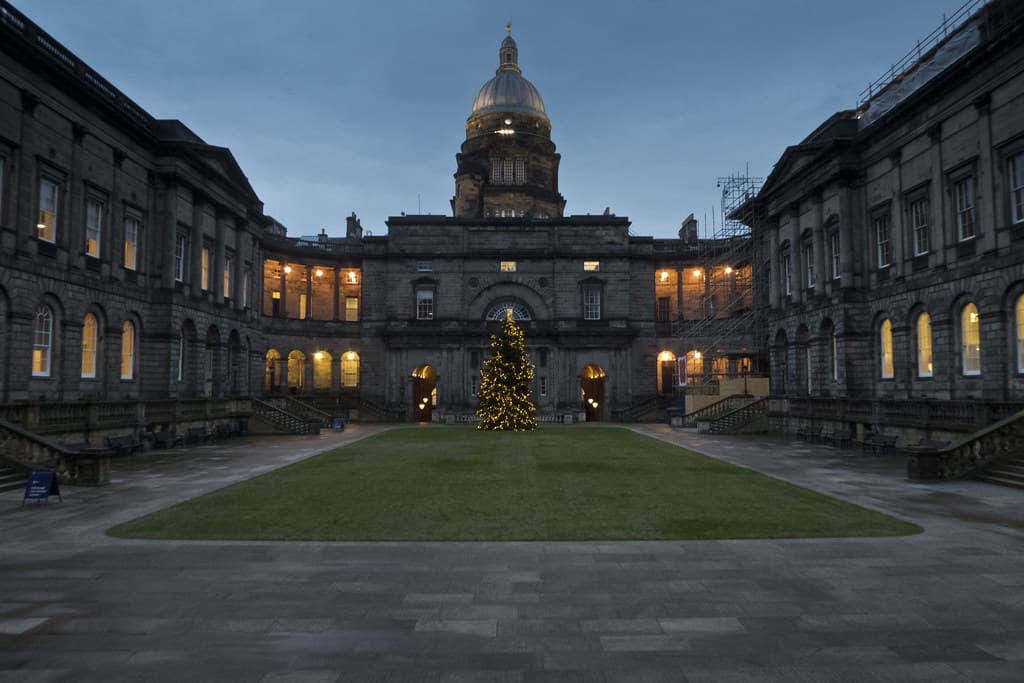
The Old College is one of the buildings of the University of Edinburgh in the city centre. An architect named Robert Adam designed this building to replace a few older buildings of the university.
This building is currently home to the School of Law, some parts of the University’s administration, and the University’s public art gallery, the Talbot Rice Gallery.
Price: Free
Skip to the next section: Off-beat things to do in Edinburgh

Arthur’s Seat is the name of an extinct volcano, which is the main peak of a park called Holyrood Park.
For a very accessible hike just outside the city centre, Arthur’s Seat is the place to be.
When we were in Edinburgh, we were greeted by a man in a traditional kilt playing the bagpipes at the summit of Arthur’s Seat.
Price: Free
As mentioned earlier, Mary King’s Close is one of the most notable historic closes off the Royal Mile in the historic city centre of Edinburgh.
This particular close was named after Mary King, a burgess who lived here in the 17th century.
At the time of the construction of the Royal Exchange (18th century), this close was shut off for the public and became shrouded in mystery.
Today, Mary King’s Close is operated as a visitor attraction.
Price: A guided tour by Real Mary King’s Close costs £16,50 for adults and £14,25 for students.

Princes Street is the southern border of Edinburgh’s New Town district, and also the city’s main shopping street.
The street has been an important part of Edinburgh’s street plan ever since its construction in the 18th century. Today, the north side offers many shops to travellers and locals alike, while the south side gives everyone a scenic view of the old town and Princes Street Gardens.
Price: Free

If you like optical illusions, holograms, photography and interactive exhibits, Camera Obscura is the place to be.
Founded by Maria Theresa Short in 1835 as a way to exhibit scientific instruments, Camera Obscura today features over 100 exhibits, games and shows that are worth an hour or two of your time.
Don’t miss the vortex tunnel, the camera obscura show and the panoramic view of Edinburgh on the top floor.
Price: £16,50 (adults) / £14,50 (students)

As one of the most photographed locations in the entire city, Victoria Street is among the most recognisable and picturesque streets of Edinburgh.
And, to be honest, who could resist snapping a few photos of the curved street with its brightly coloured storefronts?
Fun fact: Victoria Street is often rumoured to have been the inspiration for Harry Potter’s Diagon Alley, as author J.K. Rowling spent most of her time writing her magical stories in Edinburgh.
Price: Free
The Royal Mile is the common name of the most important — and most-visited — street of Edinburgh’s Old Town district.
In reality, the Royal Mile isn’t the actual name of this street. Rather, it’s a succession of different, smaller streets (Castlehill, the Lawnmarket, High Street, Canongate and Abbey Strand).
Stroll along this vivid street to see street performers and buskers, eclectic shops, unique restaurants and funky pubs.
Price: Free
The Royal Botanic Garden of Edinburgh is one of Britain’s main scientific centres for botany. The Garden’s collection currently includes over 13.000 plant species.
In 2020, the botanic gardens are celebrating their 350th birthday — the perfect moment to learn all about the botanical history of Edinburgh and Scotland.
Price: Free entry to the gardens; £7 to enter the glasshouses (£6 for students)
Skip to the next section: Where to eat and drink in Edinburgh
The Surgeons’ Hall Museums were opened to the public in 1832, after having taught medicine students about bone and tissue specimens and works of art for hundreds of years.
If you want to learn about the history of pathology, medicine and surgery, SHM is the place to be.
One of the interesting attractions in the museum is a mock anatomy theatre where a short video teaches you about the history of public dissection among students of medicine.
Price: £8 for adults, £4,50 for students

The Holyrood Abbey Church was completed in the early 13th century. Ever since its construction was finished, it served as a central point in Scottish and English history.
The building started decaying due to several wars and revolutions throughout the years. The roof collapsed in 1768, and the abbey ruins have looked the same way for the last 250 years.
Price: Free
Dr Neil’s Garden is a garden located on the eastern side of the Holyrood park. It can easily be combined with climbing Arthur’s Seat into a day trip.
This garden has often been referred to as a hidden gem in Edinburgh. The garden houses rare plants, fabulous walkways and peaceful places to sit.
Price: Free, donations welcome

If you’re wandering along the Royal Mile and have an hour to fill, check out the Museum of Childhood.
As the name reveals, this museum focuses on objects, toys and games relating to childhood life. These objects tell the story of how children grew up in Edinburgh throughout the years.
The museum also has several interactive spaces and attributes to take photos with.
Price: Free, donations welcome
Skip to the next section: Where to stay in Edinburgh
(Click the links to go to the websites of these Edinburgh restaurants and bars)

When we’re talking about Edinburgh bars, we can’t leave out the Grassmarket area. This is a historic market place in the city centre and it’s home to many interesting bars, pubs and cafés.
Cocktails in Edinburgh? Look no further. Dragonfly has excellent drinks and very friendly staff members to serve them.
If you’re looking for ice cream in Edinburgh, you definitely need to go to Mary’s Milk Bar. They make fresh gelato every morning and the choice of flavours changes every day.
One of our favourite places to get breakfast in Edinburgh was Hula Juice Café. Established in 2007 as a juice bar, the concept now also covers healthy breakfast, brunch and lunch. (And it’s plastic-free!)
Brass Monkey is a bar and restaurant in Edinburgh’s Southside district. Besides food and drink, they also have a cushioned cinema room, board games and dartboard and arcade machines. (Plus, the drinks come with a student discount!)
Cuckoo’s Bakery is THE place to go for fresh, quirky cupcakes in Edinburgh. The cupcakes are baked from scratch every day and there’s a weekly special to surprise you!
If you’re into vegetarian food, local and international beers and good music, take a look at Paradise Palms. The food is award-winning and American-inspired, but without the meat.
This restaurant has a special place in my heart. Locally sourced burgers, mouth watering cocktails and a great atmosphere. What’s not to love?
The City Cafe is an mid-century American-inspired diner off the Royal Mile that has served burgers, all-day breakfast, milkshakes and drinks since the mid-1980s. My recommendation: full Scottish breakfast with haggis and black pudding.
Timberyard is a slightly higher-class family-run restaurant in an authentic brick warehouse. Here, you’ll find dishes and menus that use ingredients supplied by local growers, producers and breeders.
Spoon is a bistro-slash-cafe-slash-restaurant in Edinburgh that — according to their own website — aims to close the gap between a casual cafe and a formal restaurant.
Skip to the next section: Edinburgh solo travel tips
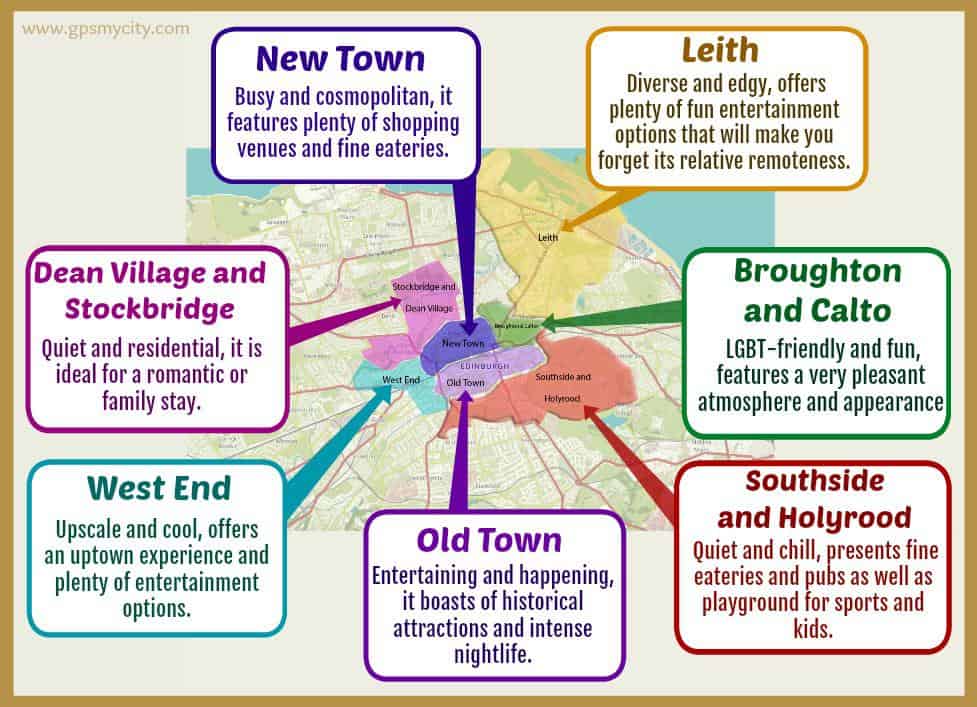

Hostels in Edinburgh are clean, high-quality and easily accessible. Prices for a bed in a shared dorm room run between €10 and €20 per night.
Find Edinburgh hostels here.
Related: How to find cheap hostel rooms
Short-term rentals are much less of a problem in Edinburgh than in other major cities, such as Paris and Barcelona.
As such, you can find some great places to stay as a solo traveller in Edinburgh.
For example, I shared a flat near Grassmarket with my two best friends.
Pro tip: sign up for Airbnb through this link and earn over €40 off your first trip.
In the interest of full transparency: I’ve never used Couchsurfing before. But it’s been on my list for a while now.
That being said, I’ve only heard good things about Couchsurfing. You get to stay with a local, who might be able to show you the ins and outs of the city, and — best of all — it’s completely free.
What’s not to love?
For anyone who might want a bit more luxury during their solo travels, it’s worth looking into budget hotels.
They’ll cost a bit more than, say, a backpacker hostel or an Airbnb, but you’ll get what you pay for.
A private bathroom, breakfast buffet or a hotel gym are just a few things that you could expect when you’re booking a hotel in Edinburgh.
Skip to the next section: Free Edinburgh solo travel guide (itinerary pdf)

An Edinburgh solo travel guide is nothing without some specific information about how to actually – you know – visit the city as a solo traveller.
As I’ve mentioned a few times in this article, Edinburgh is a very walkable city. The city centre isn’t very big, and you can get from one side to the other in about half an hour.
That said, if you’re looking to venture a little further than the Royal Mile or Princes Street, the buses in Edinburgh are also available.
All buses are operated by Lothian. A single journey costs £1,80 and you can purchase tickets on board with exact cash or contactless credit/debit card, or you can pre-purchase using the Lothian app.
Good to know: Lothian also operates Airlink 100, a bus that will take you from the airport to the city centre (and vice versa) for £4,50 one way.
As a solo traveller in Edinburgh, it may be worth it to purchase an Edinburgh City Pass. At £45 for one day, the price is rather steep. However, with some careful planning, you can fill a day with things to do in Edinburgh and get enough value out of the pass to justify its cost.
The Edinburgh City Pass also includes a free airport transfer by tram and a free guide book.
If you want to visit the Edinburgh Zoo, Edinburgh Dungeon, Scott Monument, Holyrood Distillery and more, you should look into buying an Edinburgh City Pass.
Edinburgh is literally world-famous for its festivals. They bring people from all walks of life together, and people come from everywhere to be a part of the celebrations.
And that’s one of the reasons why these festivals are perfect for solo travellers. Many of the people attending will also be travellers, which means you can easily socialise with them and maybe make some new friends.
Some examples of events worth attending in Edinburgh:
Aside from my tips for finding cheap food as a solo traveller in general, there is something I can tell you specifically about Edinburgh.
If you’re looking to cut down your food budget, don’t eat at restaurants.
A great option in Edinburgh is pubs located in closes and streets that go off of the Royal Mile. These pubs serve great food that will be cheaper than what you’ll get at proper restaurants.
Here are some great options for pub food in Edinburgh.
If you’re trying to save even more, have your main meal of the day at lunch and cook your own dinner.
Let me end this Edinburgh solo travel guide by saying this: if you’re in the Scottish capital and you’re not talking to locals in some way, you’re doing it wrong.
Edinbuggers are very friendly, willing to connect with travellers and share stories with one another.
Take advantage of that. After all, what’s solo travel about if not connecting to people and getting to know the world around you?
As a little bonus, I’ve put together a free Edinburgh solo travel guide for you. It’s a downloadable Edinburgh itinerary (pdf file) which you get access to by leaving your name and email in the form below.
PIN IT!



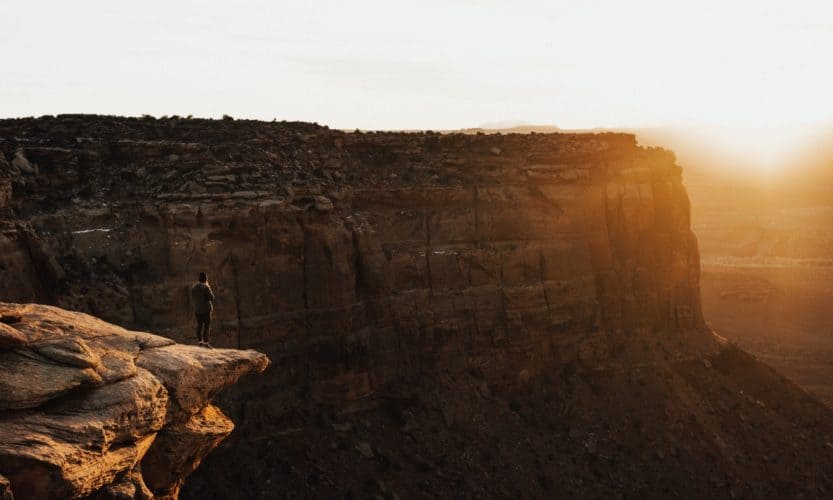
Solo travel can be a bit scary since you are going out into the unknown world all alone, but you have the power to protect yourself. Self-defence isn’t ninja moves and crazy movie stunts; it is taking action to prevent bad situations from happening in the first place. We all deserve to be safe, but to do that, we must learn how. That is why I am sharing these tips on solo travel safety with the readers of Ars Currendi. I want you to be safe wherever you wander on this beautiful planet, so check it out!
Guest post by Chelsey from The Ninja Gypsy

While I am not asking you to dictate every moment of your life, I do think that it is vital to have a game plan for when something goes wrong. I always tell my students and those interested in (solo) travel to play the “What If?” game.
This game is pretty simple. All you need to do is think of things that could go wrong on your trip and find a solution to solve them. For example:
What are you going to do? While this may not be the most fun game to play, it is vital for your solo travel safety. Addressing these possible scenarios in advance will help you conquer them quickly if they do arise.
Don’t be caught unaware, without any idea on how to handle a problem. Take preventive action to ensure that you can eliminate any challenge that comes your way by having a plan.
Related post: Planning a solo trip: solo travel 101
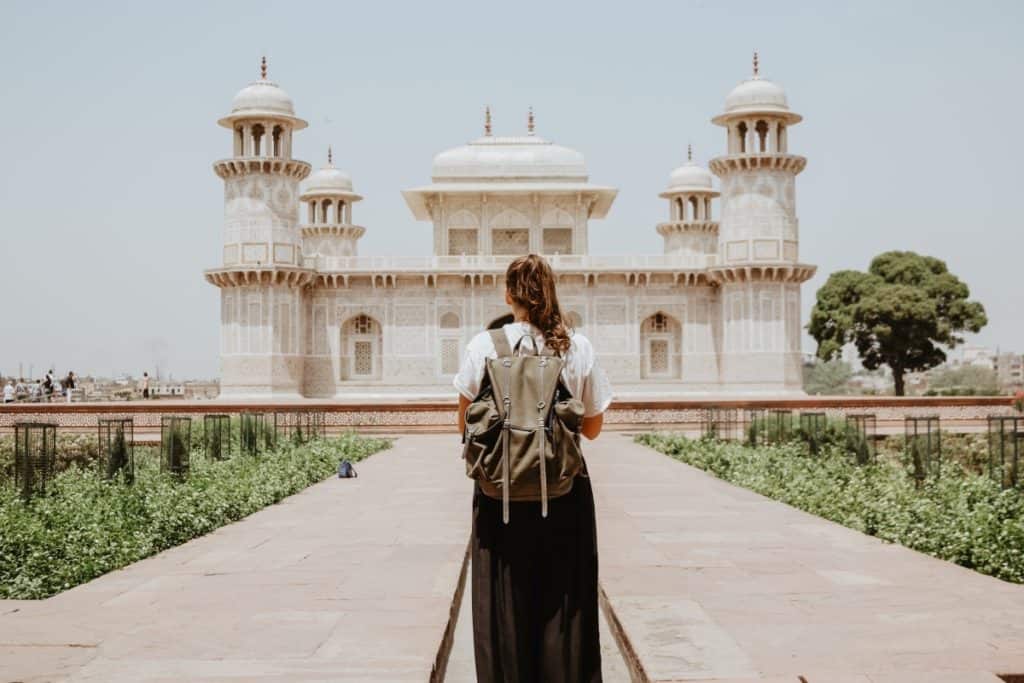
Similar to having a plan, it is wise to know the communities in which you are travelling.
The world is a big place filled with fascinating cultures and ideals. It is ignorant to assume that our way of life will be accepted everywhere we go, especially for those female solo travellers out there.
Before you travel somewhere, look up the customs and expectations of the culture. You may need to dress a certain way, hide your tattoos, or any other variety of things.
I am not saying that their culture is correct, but for your safety, it is wise to respect and adhere to the norm. As a super pale, blonde, blue-eyed woman, I know what it is like to stick out.
Doing some research, for both guys, gals and non-binary people, on how to blend in and packing your suitcase appropriately will help save you from unwanted attention.
In addition, learn about the dangers of where you are going. Is the area known for pickpockets, or is there civil unrest?
You can learn about it by visiting the Department of State‘s website, and I would suggest signing up for the Smart Traveler Enrollment Program (or something similar) to be notified when something goes wrong in your location.

A big part of solo travel safety is being aware of your surroundings, but what does that mean?
It means engaging all of your senses to be mindful of your environment. This could be while you are walking down the street, attending a festival, relaxing in a dorm room at your hostel, or partying at a club.
I am NOT asking you to be paranoid or scared; I am simply asking you to use your head.
Your brain works like a computer.
It gathers information on what is going on around you, filtering out the unimportant, and notifying you when something is worth noticing. This may be the scrape of a shoe that is too close behind you, a person intently staring at you from the corner of your eye, or that uneasy feeling when something doesn’t seem right.
Your brain is automatically doing all the work; you just have to listen to it. Don’t ignore those warnings, but acknowledge them.
Your brain can’t do it by itself, though, you are a team. If you plug your ears with headphones or cloud your senses with alcohol, it makes your brain’s job significantly harder.
Always be wary of things that impede your ability to be aware. I’m not saying that you can’t listen to music while you run, but instead, only have one ear in with the volume low.
I’m also not saying that you can’t drink but know your limits. Adhere to safe alcohol practices so that you are never left at the mercy of someone else.
Don’t take this as a reason why you shouldn’t travel solo. Just keep in mind that, while you are on the road alone, you need to be aware of your surroundings.
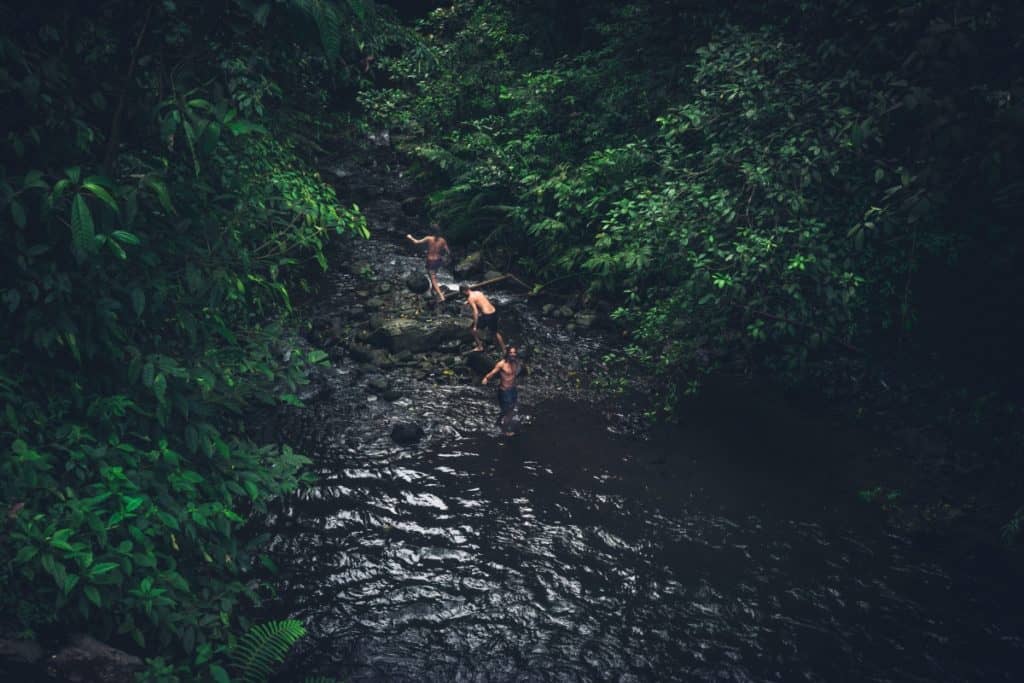
You are responsible for your safety when travelling solo. Friends, parents, and significant others can’t help you when you are on your own, and they can’t tell you when something seems off.
You must trust yourself and trust your instincts to keep you safe.
We have base instincts, they are built-in, but society today has led us to ignore them even when they point out danger. We might tell ourselves that we are being silly or paranoid, but your instincts are a powerful tool that should not be ignored.
If your instincts are telling you that something is off, that you are in danger, then leave.
Whether you are in a hostel, a bar, on a date, or walking down the street, listen to yourself. If you were wrong, oh well. But if you were right, you might have just saved your life.
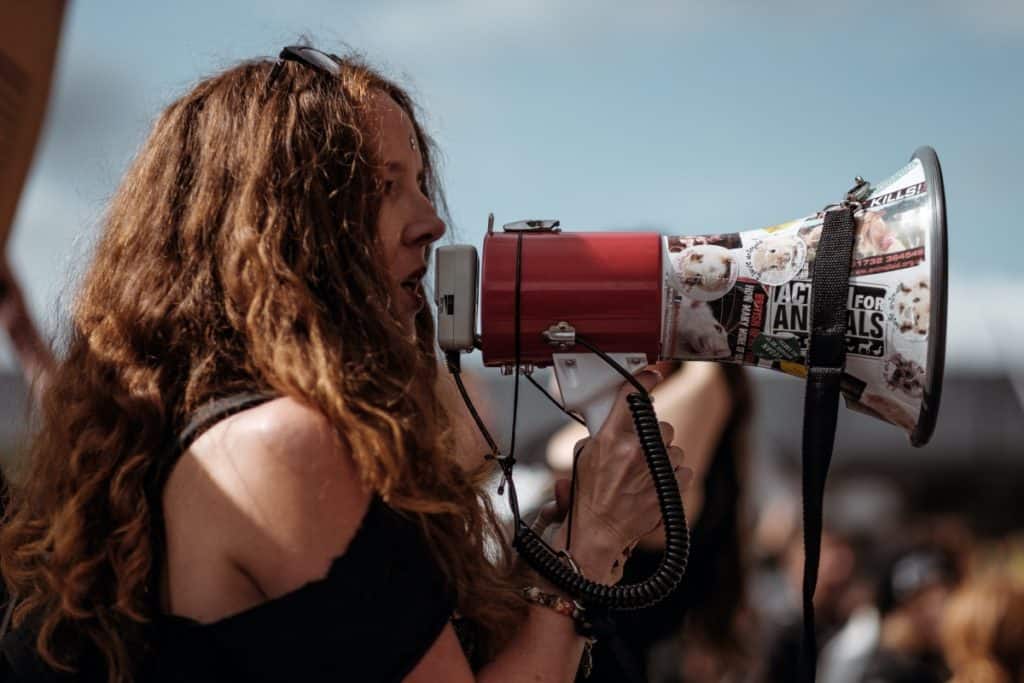
Verbal communication is a large part of self-defense, and thus, a large part of solo travel safety. In most scenarios, there is a way to verbally de-escalate the conflict without it coming to blows.
The key to communicating with confidence is being concise, clear, and repetitive. Whatever is going wrong, repeat these critical steps.
Be concise. Tell the person exactly what you want in a short sentence. It could be “don’t touch me,” “please back away,” “I don’t want to dance,” or any other variety of messages.
Keep it short and straightforward.
Be clear. Use a strong, determined voice with a body to match. Communication is not only through your words but with your body language. You always want both of those actions to be in sync.
If you are looking like a mouse and speaking in a tiny voice, a person with ill intentions may think that they can change your mind. Don’t let them think that.
Stand up straight, look at them, and say what you want in a clear and confident voice.
Be repetitive. Some people have pretty thick heads, and it may take a couple times before the message gets through, so repeat yourself. If they try to coax you, repeat yourself. If they try to rephrase, repeat yourself. If they try to manipulate you, repeat yourself.
The same phrase on repeat like a broken record.
With each rendition, get a little louder and move further away. Your rising voice will alert those around you of what is going down while your body language shows that you want none of it.
Remember, it is always okay to say no to any question or request. You owe them nothing.
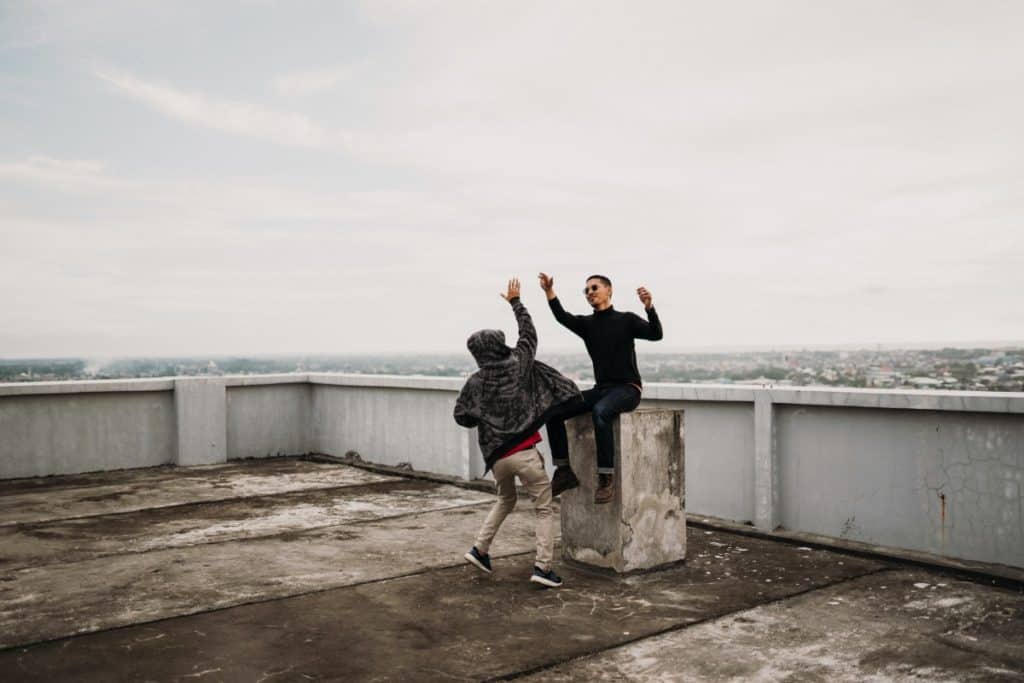
Just because you are travelling solo doesn’t mean that you are alone. If you are feeling unsafe, you always have the option of grabbing a buddy.
It could be a bouncer, a bartender, a receptionist, a friend that you made earlier, or even someone similar to yourself in the crowd.
Team up with them when you are in a situation that you don’t like until you can both get to safety; there is truth in the statement “there is safety in numbers.”
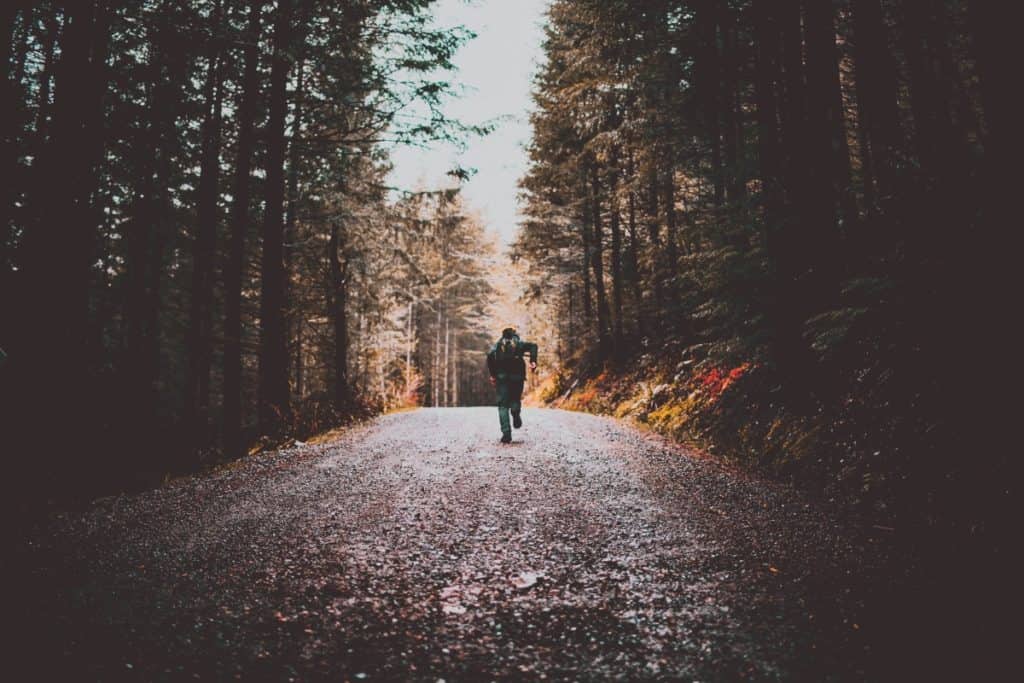
If you are ever faced with a dangerous situation, the most important thing is to get away.
It doesn’t matter how you do it, as long as you get to a safe place. Safe places can include police stations, fire departments, hospitals, large stores, and crowded areas.
Make your way to a busy, well-lit place and find someone who can help you. Emergency services personnel, clerks, bouncers, bartenders, and others are prepared and ready to help you if you need it.
Once you get someplace safe, you need to report what happened. If you got hurt or hurt someone else, you want to be the first to report it. This way, you will avoid the “she said/he said” aspect that could get you in trouble. Get to safety and then call for help.
For those who are travelling alone, I recommend taking a self-defense class first. This will not only teach you critical self-defense techniques, but it will show you safe practices that will help you avoid those conflicts altogether.
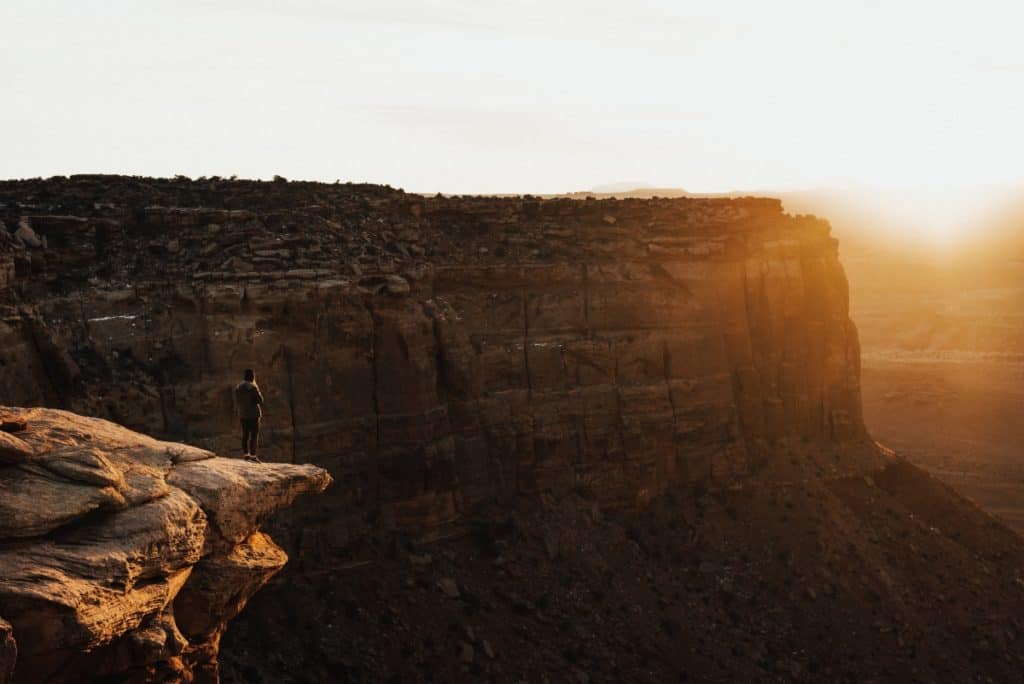
If there is just one message that you can take away from this post, it is that you deserve to be safe.
It doesn’t matter who you are, where you are from, or what your station in life is, you deserve to be safe and to feel safe. But the only person who can give that to you IS YOU!
Take preventive action when it comes to your safety, in whatever form works best for you.
You have the power to learn. You have the power to act. You have the power to keep yourself safe. So before you head out on your next daring solo adventure, take the time to learn how to be safe.

Chelsey is the creator of The Ninja Gypsy, a travel safety website designed to keep you safe wherever you travel. Chelsey is a 3rd-degree black belt, digital nomad, and author. She recently published a book called “Inspired: The Stories of Nine Solo Female Travelers,” combining her travel experiences with other women who have been around the world. If you would like to learn more about Chelsey, you can follow her on Facebook, Instagram, and Pinterest.
PIN IT!
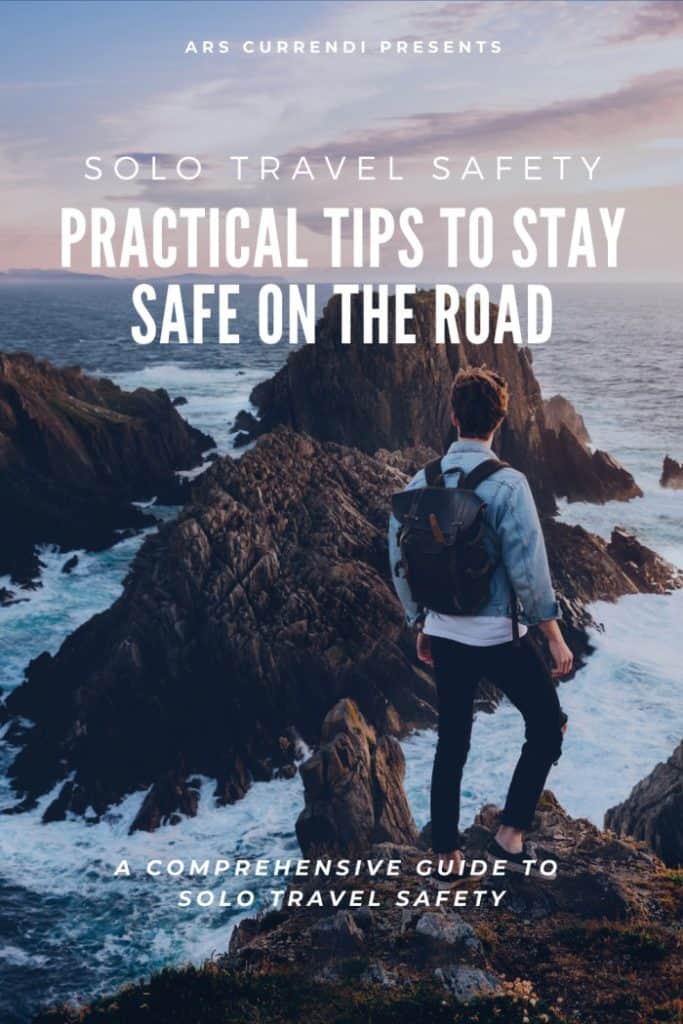
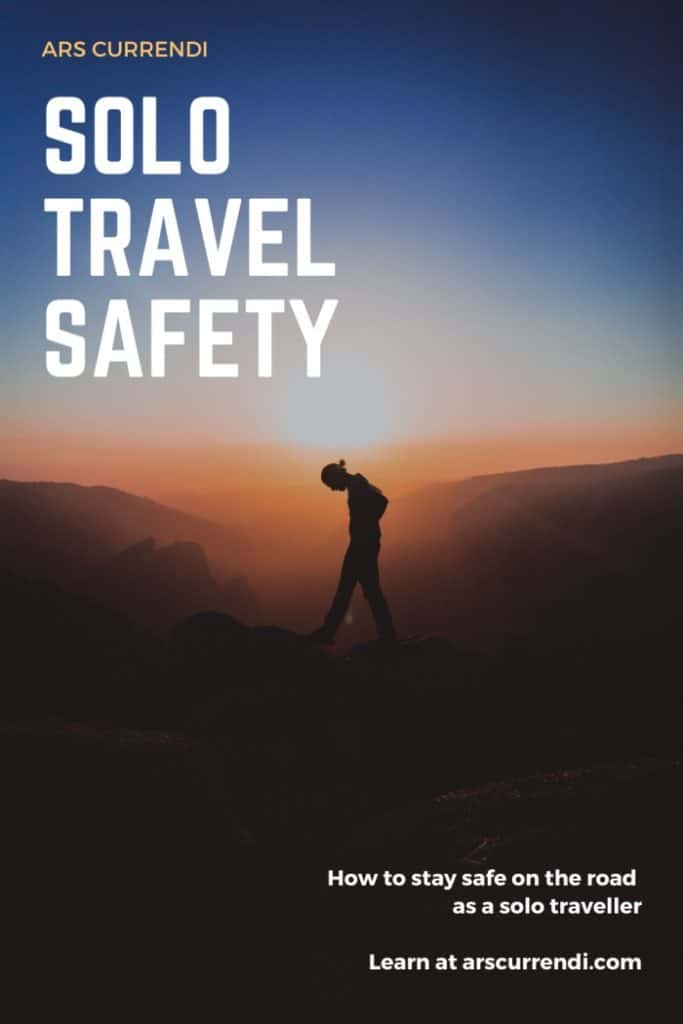
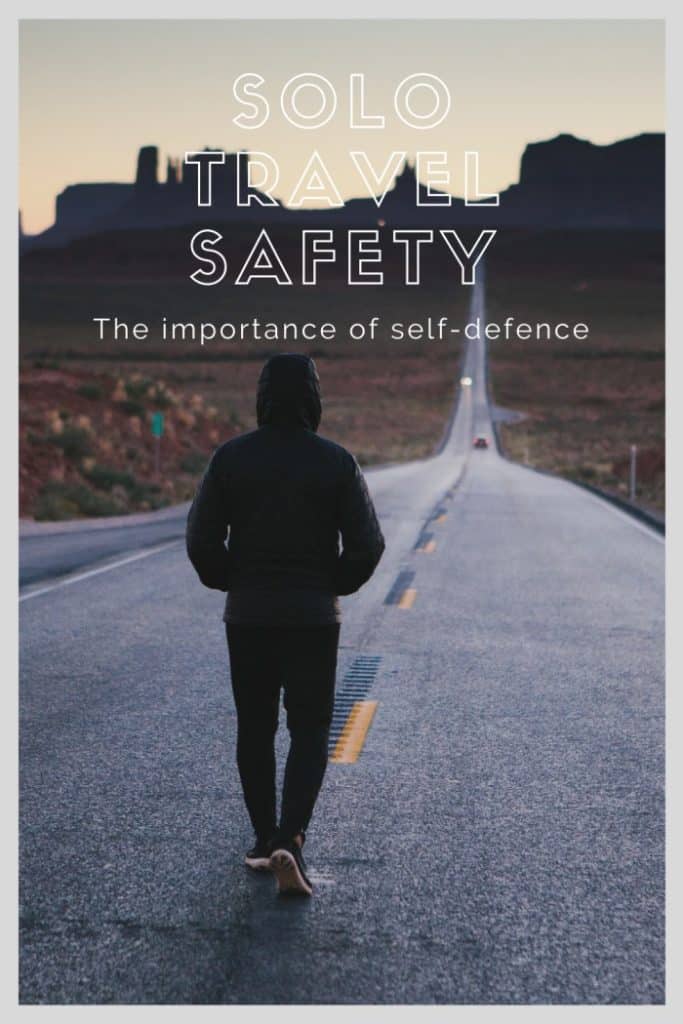
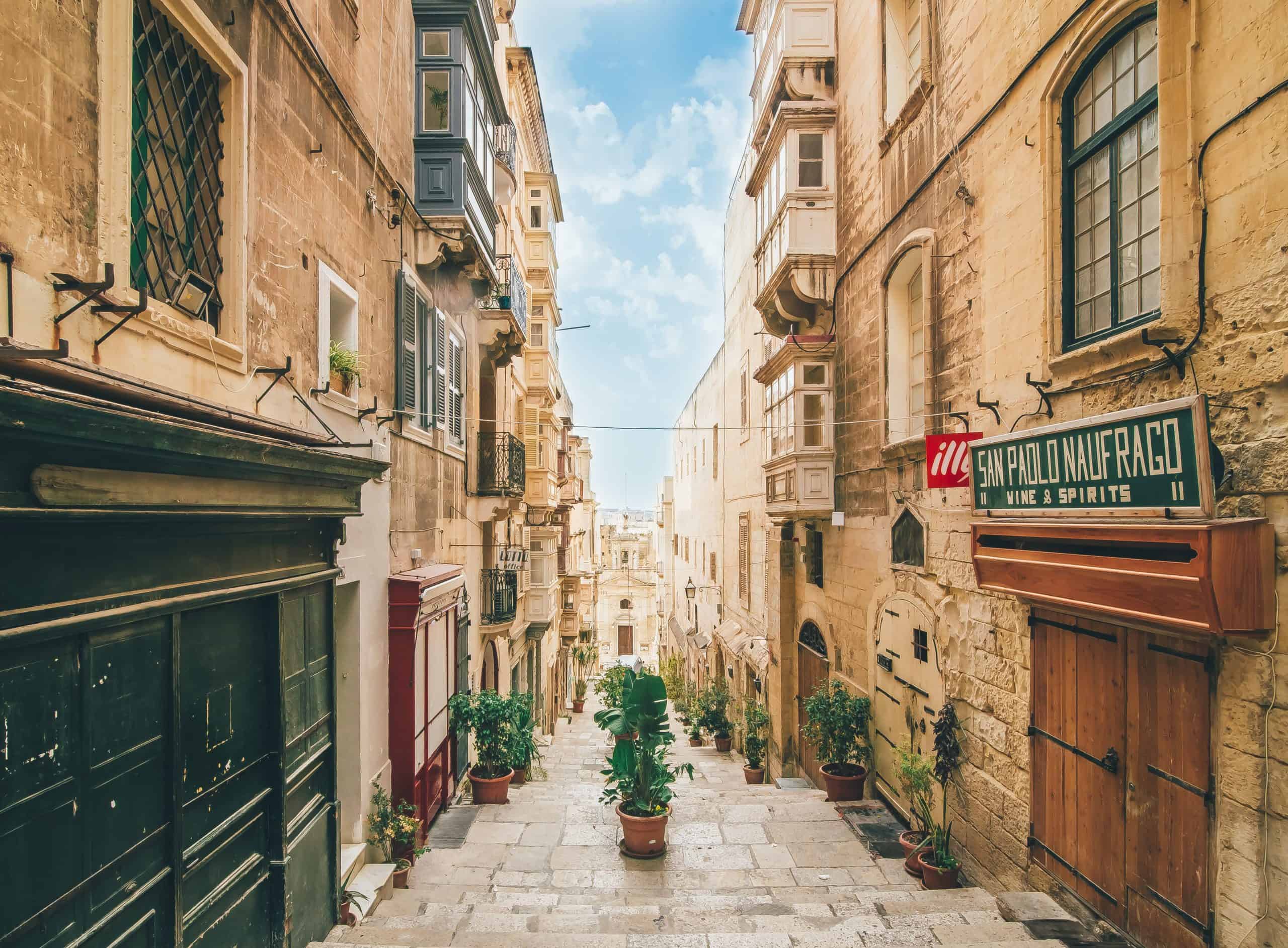
On my second ever solo trip, I spent six days in Malta and I loved every second of it. Now, I want to share my knowledge about this Mediterranean island with you. This is my Malta solo travel guide.
In the early days of my blog, I wrote a blog post about my time as a solo traveller in Malta. But now, I realise that this article was a narrative rather than a blog post that was useful to my readers, so I wanted to write this for the people who want to pursue solo travel in Malta themselves.
Note: this post includes a downloadable 6-day solo Malta itinerary! Subscribe below to get it to your mailbox.
Before we go any further, why don’t you take a look at this Malta travel video I made when I was there in 2017?
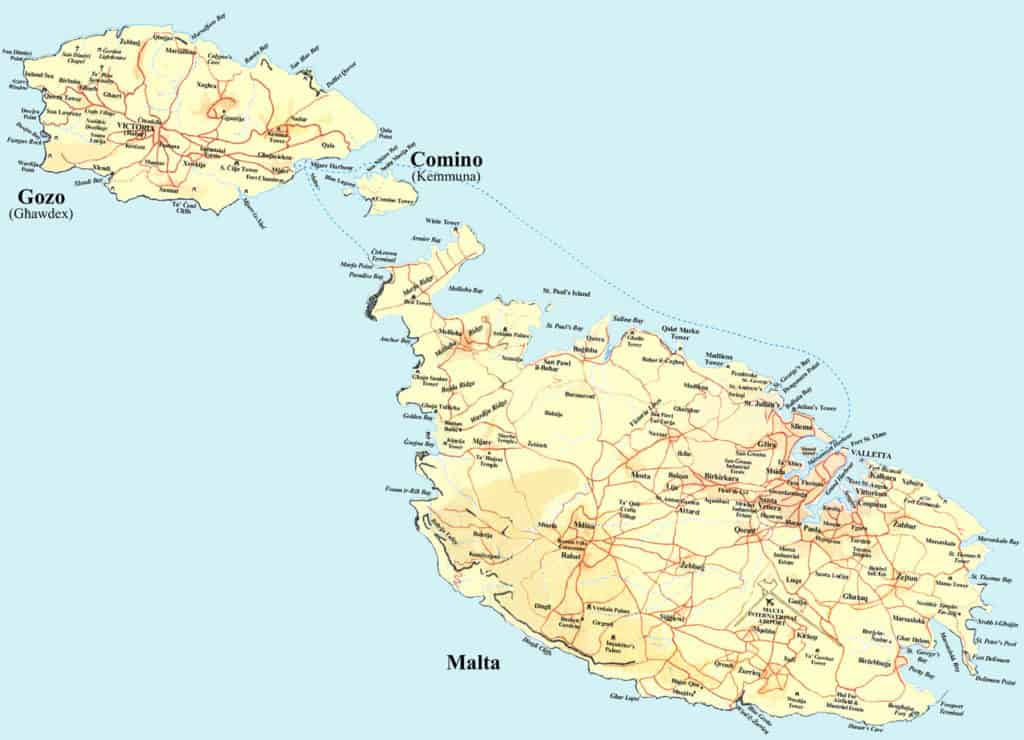
Malta is a small nation-state located in the Mediterranean Ocean, made up of a three-island archipelago. The main island, Malta, is the biggest one and houses the country’s capital, Valletta. The other islands are called Gozo and Comino.
Now, a few frequently asked questions to get the most commonly Googled queries out of the way.
Including expenses like transport and accommodation, you’ll probably need to budget about 50 USD per day when visiting during high season.
(In Malta, high season is between June and August)
Malta is very safe for solo travellers. The locals are friendly and speak English, there’s a vast network for public transport and there is a low crime rate throughout the island.
Malta is mostly famous for its great diving spots, stunning historical architecture and its nature, which has been used in big movie and TV show productions (like Game of Thrones, World War Z and The Da Vinci Code).
The main way to get to Malta is by plane. Most airplanes to Malta will land on Malta International Airport (also sometimes referred to as Luqa Airport).
This airport is served by many budget carriers like Ryanair, WizzAir, EasyJet and Norwegian. It’s also a hub for Air Malta.
International flights to Malta usually connect through a European hub, like Frankfurt (Lufthansa flights) or London (easyJet flights).
Finding flights as a solo traveller is easier than when you’re travelling with other people. After all, you only need one seat – duh.
My favourite websites to find flights are Google Flights, Momondo, Expedia, Cheap Flights and Skyscanner.
If you are unable or not willing to take a flight to Malta, there is another option. Two companies regularly operate ferries between Italy and Malta.
Virtu Ferries and Grimaldi Lines operate ferries from Catania to Valletta and Virtu Ferries also operates ferries from Pozzallo to Malta.
Check out their websites for more information.
Be advised that ferries often tend to be more expensive than flights with low-cost operators.
Skip to the next section: Where to stay in Malta
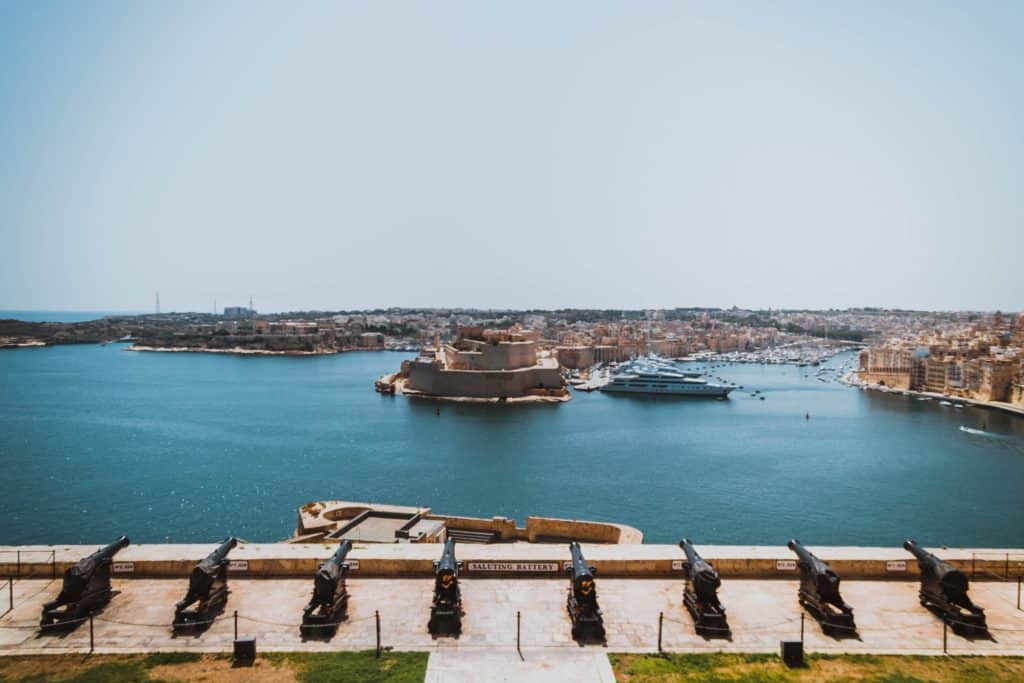
The best things to do in Malta will take you more than just a few days to cross off your list.
Below, you’ll find some of my favourite activities and places to visit in Malta, grouped by category. Keep in mind that I spent six days there, so if you have more time, you can add more activities to your travel itinerary.
Here are 20 things you have to do in Malta as a solo traveller.
Valletta is an awesome place for solo travel in Malta. Although it’s quite small, there’s more to do than meets the eye. Here are some of my favourite things to do in Valletta.
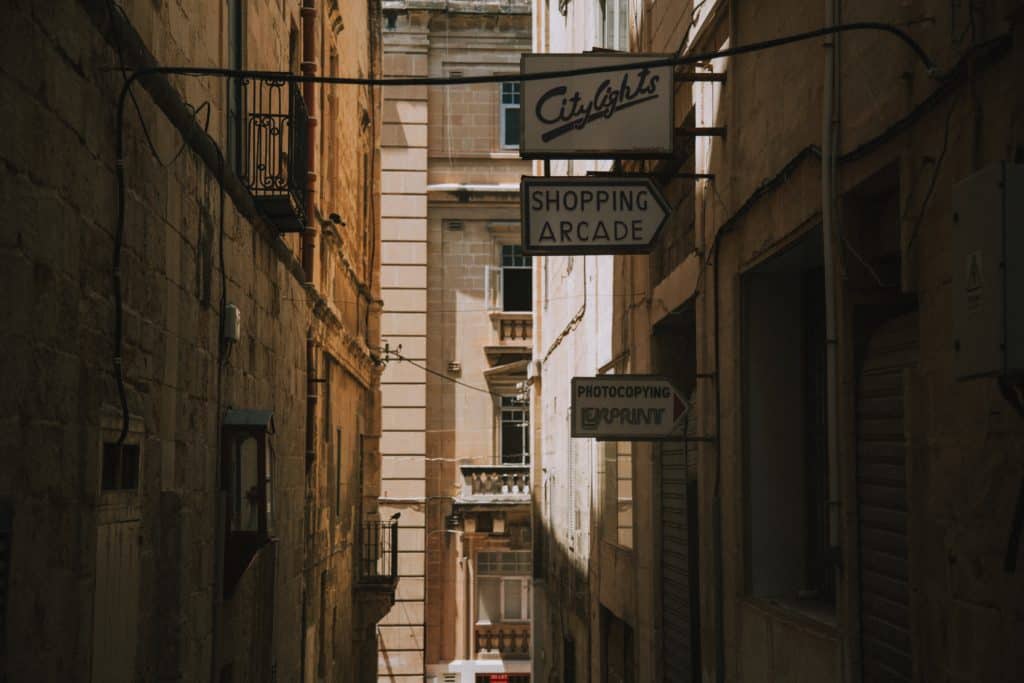
Valletta, Europe’s smallest capital, has centuries of history packed into its historical old town. And – best of all – this history is influenced by its Mediterranean, Arab, British, Italian and Castilian heritage.
The Maltese capital is renowned for its colourful balconies that tower over narrow streets and its small, independent shops.
Walk around this area for an hour or so without having any real plan. Soak everything in.
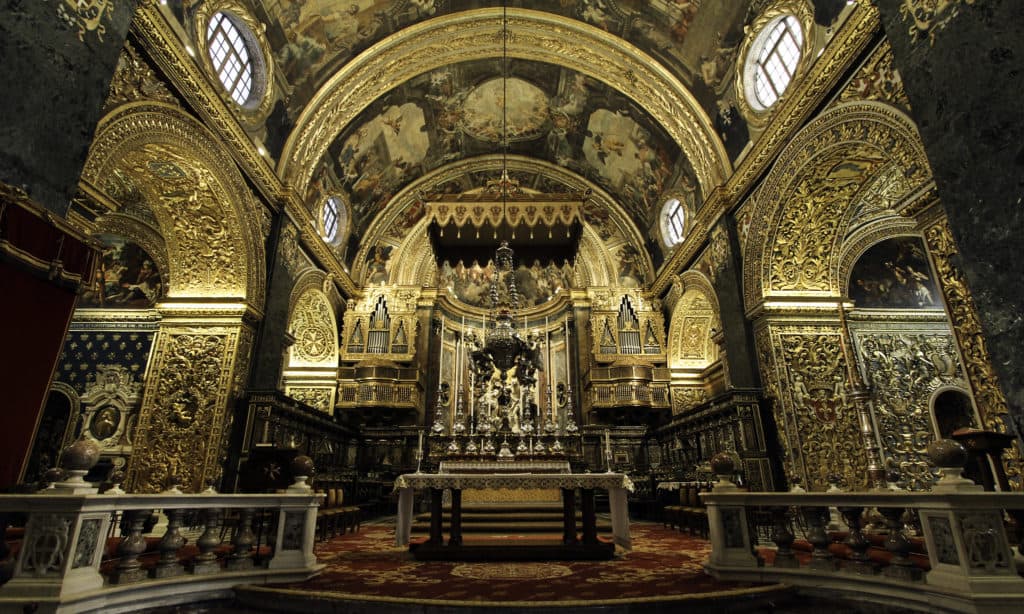
Unlike any church or cathedral I’ve ever seen, St John’s Co-Cathedral is a real baroque feast for the eyes.
The inside of the cathedral, which was constructed in 1577, is plated in gold and houses many Baroque artworks and a fascinating ornate marble floor. The most impressive feat in this cathedral, though, is one of Caravaggio’s best-known paintings: the Beheading of John the Baptist.
Admission is €10 for adults and €7.50 for students and seniors. This price also includes an audio guide and a visit to the museum.
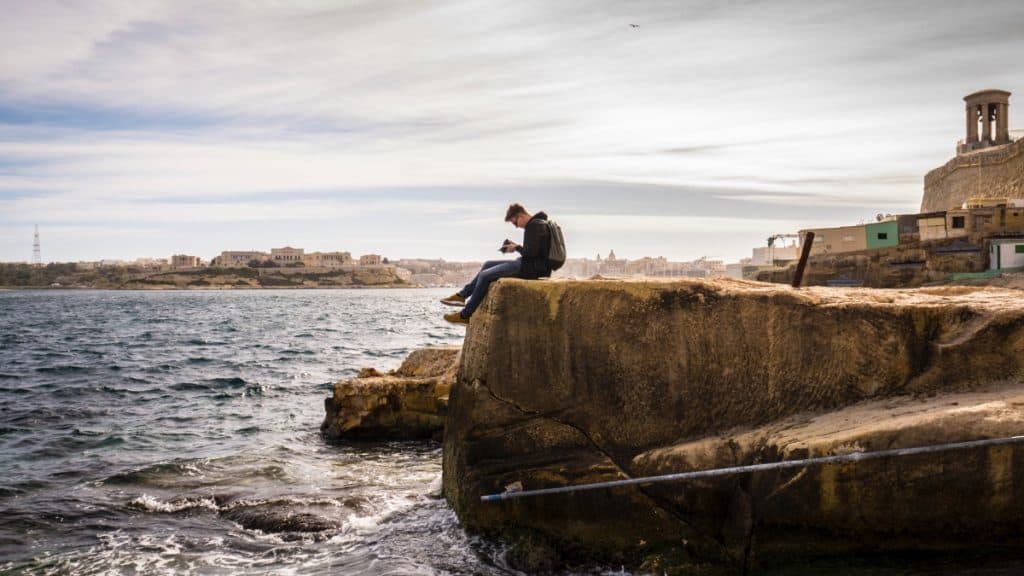
One of my favourite parts of solo travel in Malta was the Valletta Seafront. Finding your way to the water through paths that aren’t on Google Maps to walk along the fishermen is truly a unique experience.
Pro tip: don’t be afraid to leave the main road and head to the rugged rocks down below — they’re not as dangerous as they look from above.
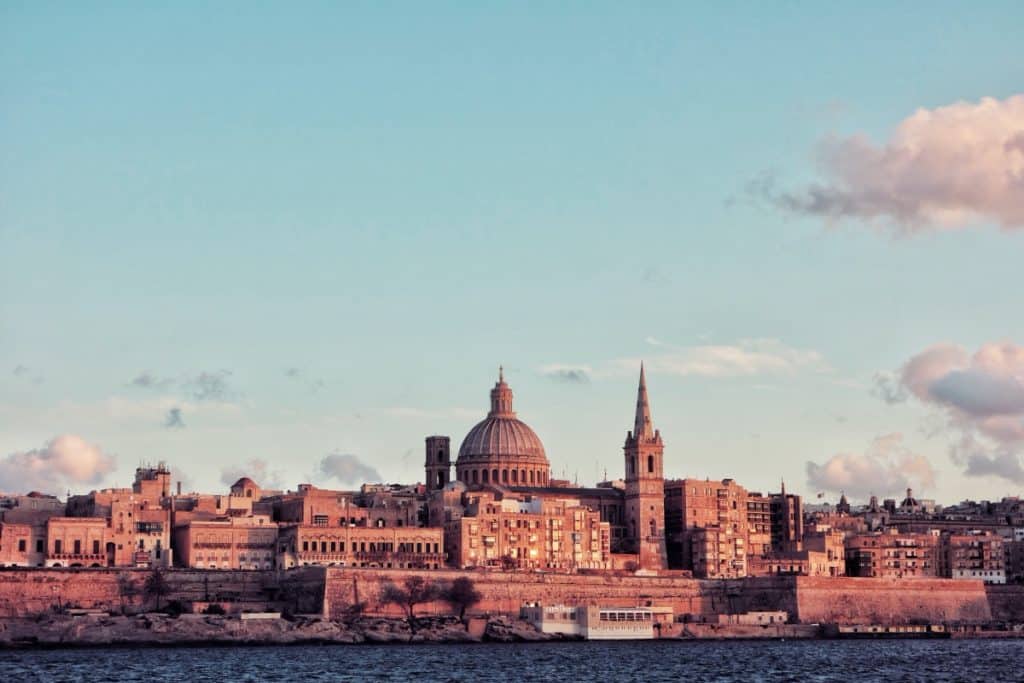
A great continuation of the last point: take a ferry across the Grand Harbour and watch the sun set from literally anywhere.
I promise you won’t regret it.
I personally watched the sunset from Valletta itself while waiting for my ferry back to Bormla, because that’s where my Airbnb was.
Get up to $40 off your first booking on Airbnb by signing up through this link!
If you’re looking for a place to get an energy fix before lunch time, look no further than the Chocolate District.
This is a small shop in one of the aforementioned narrow streets of Valletta where you can buy great chocolate bars, pralines and teas and coffee beans.
However, I recommend getting an iced chocolate drink if you’re visiting during the summer. It’s VERY refreshing and it tastes amazing.
If you’re a history buff, the Malta Experience is something for you. This is a very informative 45-minute documentary on the history of Malta. I’m personally not a huge fan of historical documentaries, but I found this one to be well-made and interesting.
After this short movie, you also get a guided tour through the infirmary.
Gugar is a great place in the city centre to get a cheap and quick bite or drink.
They don’t have a website, so it takes some insider knowledge to find this place. Luckily, I had my Airbnb host Daniel show me Gugar, and I’m glad he did.
On the menu, you’ll find a lot of vegetarian and vegan options. I can’t remember for the life of me what I had here, but the vegan ftira is supposed to be really good.
One of the best cocktail bars in downtown Valletta is called Cafe Society. The cocktails are very reasonably priced and the bar puts on frequent events, as can be seen on their Facebook page.
In short, Cafe Society is the perfect place for a pre-dinner cocktail or a late-night party.
If you’ve never gone scuba diving, Malta is the perfect place to do it for the first time.
I did the Discover Scuba Diving introduction programme with Diveshack, a dive shop that is located a short bus ride away from the capital (take bus 13, 13A, 14 or 16 from Valletta and get off at Sliema).
The people at Diveshack were very helpful and professional and their material was clean and up to date.
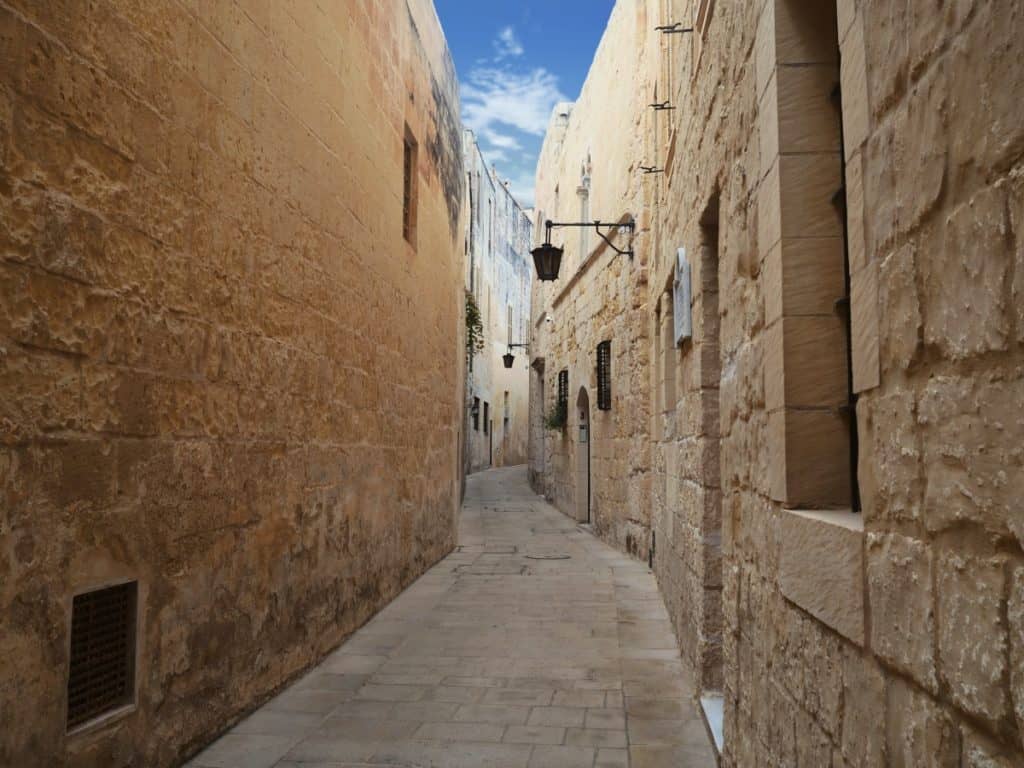
Mdina is a fortified walled city that used to be Malta’s capital. Now, the Silent City — as it’s often called — is still home to about 250 inhabitants.
Many travellers visit Mdina for its sandstone-coloured narrow streets with traditional medieval balconies and archways, as well as the many cultural heritage sites within the city walls.
Fun fact: Mdina was used as a filming location for King’s Landing in the first season of Game of Thrones. One particular scene that was filmed in Mdina was the fight between Ned Stark and Jaime Lannister.
Rabat is the city located right next to Mdina, so it’s a good idea to combine these two in one day. I recommend visiting Mdina in the morning and heading to Rabat after lunch.
One place I’d highly recommend you visit is St Paul’s Church and the Grotto upon which it was built. This grotto is linked to the Wignacourt Museum, which will be discussed shortly.
Secondly, you can’t miss St Paul’s Catacombs. This place will take you back in time to see burial rituals and urban legends from throughout Malta’s history. The Catacombs are definitely worth the €6 entry fee (€4 for students and seniors).
The Wignacourt Museum is located in Rabat and was named after Grand Master Alof de Wignacourt.
Be sure to look at the fascinating exhibits on the Order of Knights and the map room with the intriguing mappa mundi (medieval European world map).
When you’re travelling alone in Malta, you just have to venture off the main island and take in the beauty of the country’s other islands, Gozo and Comino.
Quick heads up: if you follow these tips, you should see Gozo and Comino in two days, including a night on Gozo.
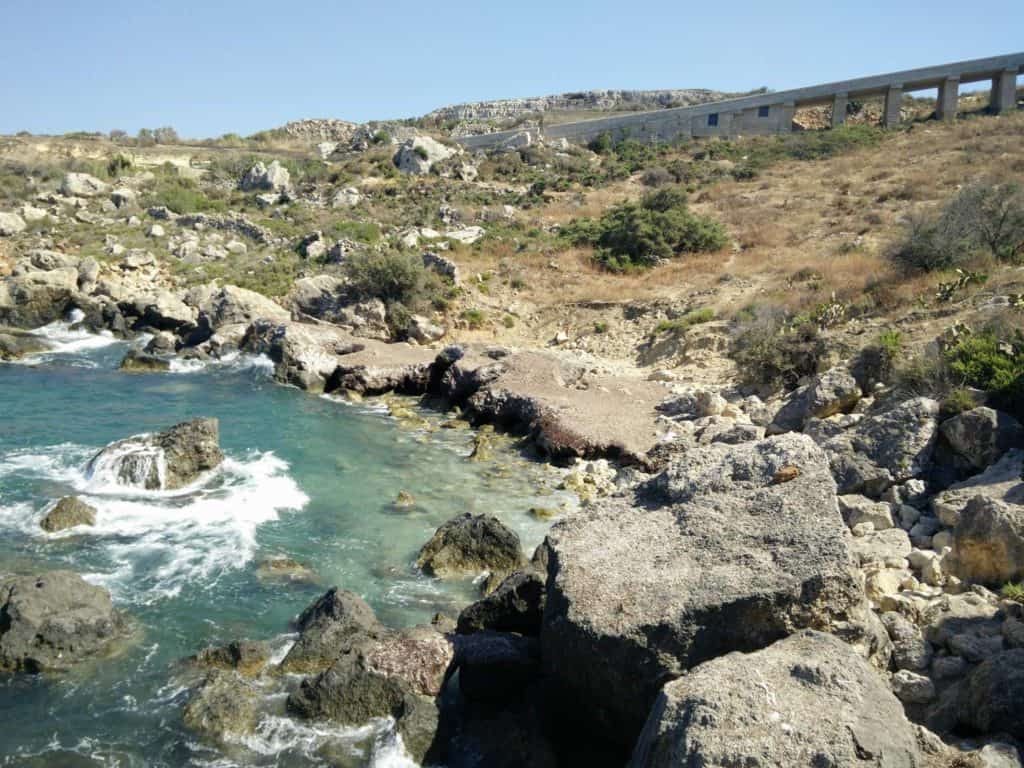
Starting off your two-day mini-trip, take a bus from Valletta to Cirkewwa, then transfer to the ferry to Mgarr and then take another bus to Qorrot. Then, walk from the Qorrot bus stop to Dahlet Qorrot beach.
DON’T FORGET TO TAKE WATER. Don’t make the same mistake that I made. Okay, moving on.
After baking in the sun and swimming in the sea for a bit, make your way to the other side of the island for your adventurous night. Take bus 303 to Victoria and transfer to bus 312 to Lawrenz. Walk the last part to the Azure Window remains.
If you still have time, you can check out the Citadel and St George’s Basilica in Victoria.
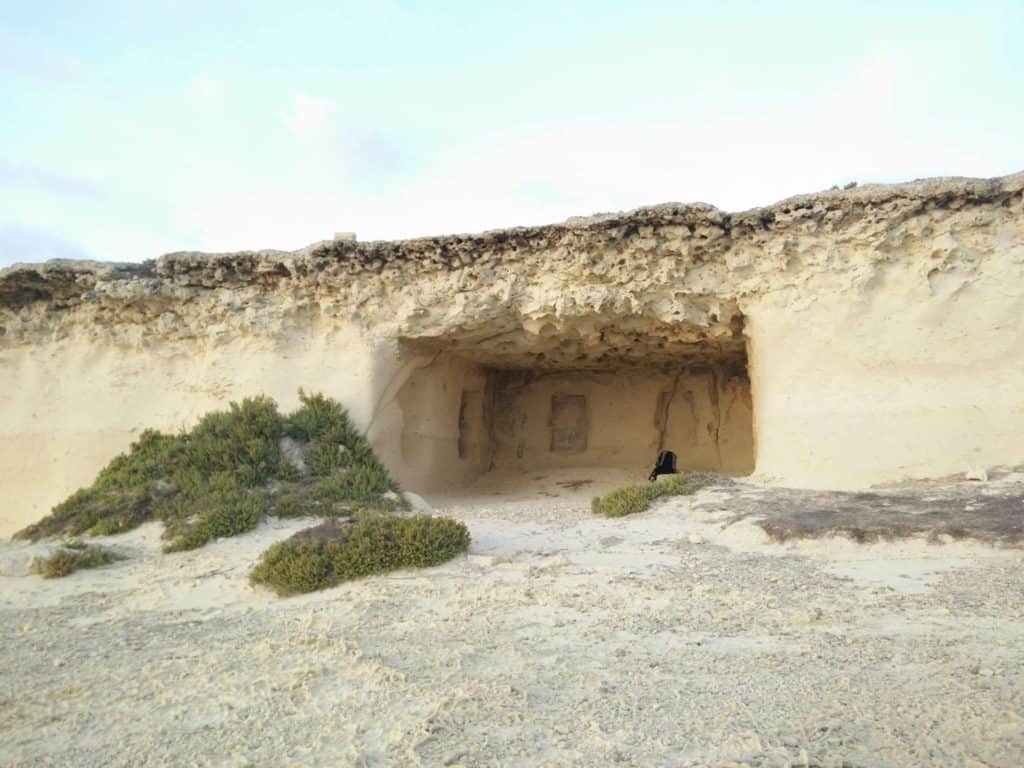
Before you get to your place to sleep for the night, take a look at what remains of the Azure Window. Although the arch collapsed in March 2017, it’s still a great place to stare at the sea and the natural rocks that the waves created.
Fun fact: before its collapse in 2017, the Azure Window was also used as a filming location for the very first episode of Game of Thrones.
After this, have dinner at the Azure Window restaurant. Pro tip: get a pizza. They’re cheap here.
Once you’ve had dinner, it’s time to make your way to the temple where you’ll be sleeping. I wrote a whole article with everything you need to know about Wardija, so go check that out for a more detailed description of how to get there.
Basically, it comes down to this. You need to use Google Maps (one of my favourite solo travel apps of 2020) to figure out the route from the restaurant to the temple.
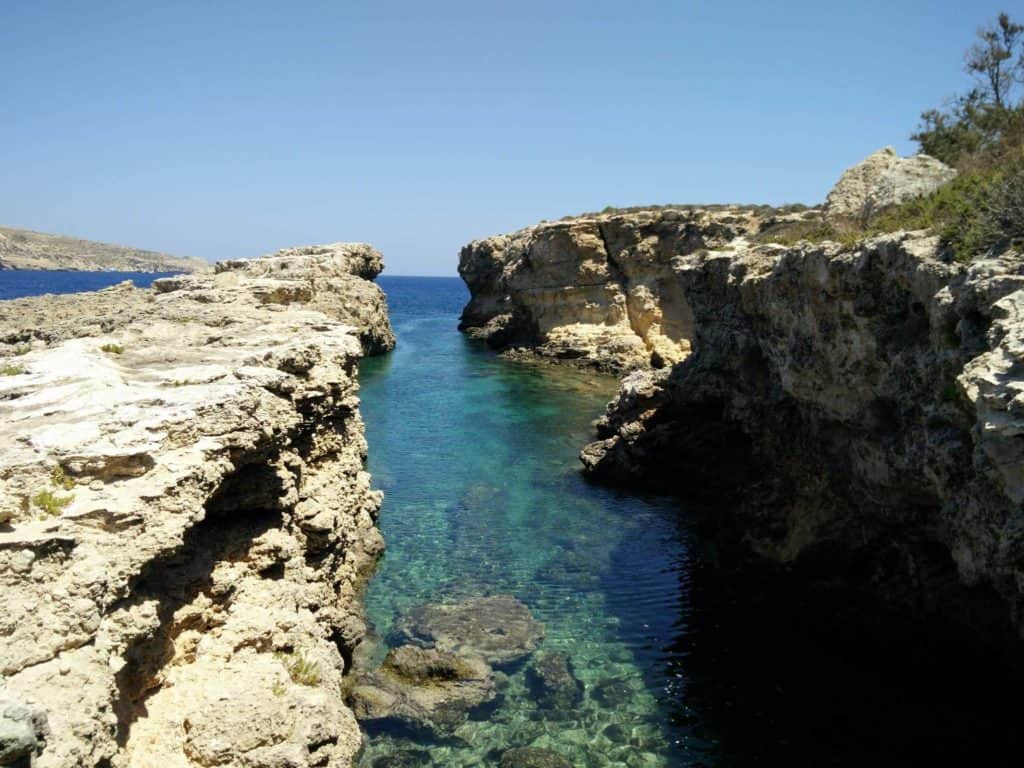
After waking up in Wardija and walking back to the bus stop at the Azure Window, take the bus back to Mgarr and board the ferry to Comino.
One insider tip I’ll give you: skip the swimming session in the Blue Lagoon if you’re travelling alone. Especially during the summer months, there’ll be too many people in the water for you to enjoy yourself. Besides, it wouldn’t be safe to leave your things unattended while you’re swimming.
If you’re in Malta during shoulder season, knock yourself out.
That being said, you can still enjoy yourself on Comino without swimming in the Blue Lagoon.
Walk around the island and explore the rough landscapes at the less-visited part of Comino. Have a Popsicle. Enjoy the sun.
When you’ve seen it all, take the ferry from Comino back to Malta.
Here are some things to do as a solo traveller in Malta when you have some time left over.
The Three Cities is a collective name for Conspicua, Birgu and Senglea — three fortified cities across the Grand Harbour from Valletta.
If you have an extra day, you may want to consider taking the ferry across the harbour and walking through the history-lined streets, soaking up the atmosphere.
These gardens are located in Attard and form a part of the President of Malta’s official estate, San Anton Palace. They’re free to enter and there is a very peaceful atmosphere, with different species of fish, birds and even turtles.
These large gardens were established during the British rule over Malta and still form a nice, calming refuge, surrounded by Malta’s busy streets.

The Rotunda of Mosta, also known as the Basilica of the Assumption of Our Lady, is a neoclassical church whose construction was completed in the early 1860s. The design was based on the Pantheon in Rome.
The big draw of this church is its ornate dome, which at one point was the third largest unsupported dome in the world.
During the second World War, a German bomb fell into the church during Mass but failed to explode. As if by miracle, nobody was hurt. A replica of the bomb is still displayed in the sacristy at the back of the church.
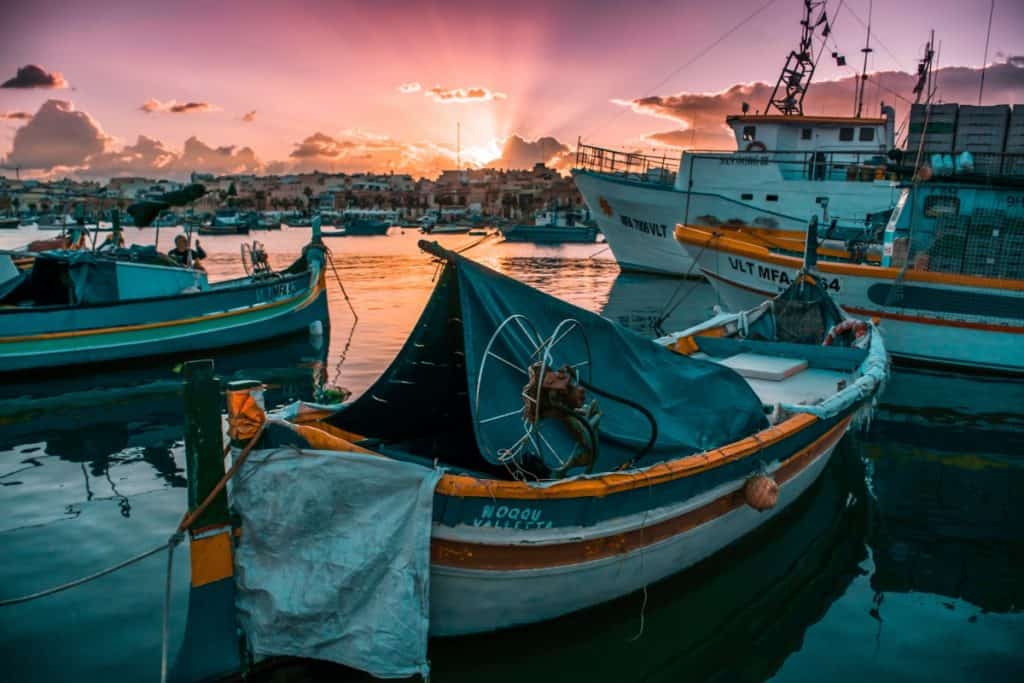
Unfortunately, I didn’t get a chance to visit Marsaxlokk, but I’ve heard that it can be a great addition to solo travel in Malta.
Any postcard from Malta worth its salt will feature the colourful fishing boats in Marsaxlokk. These boats can be spotted all over the island, but Marsaxlokk is the only place where they’re still used for actual fishery.
After wandering along the promenade, you might want to check out the Sunday fish market or pay a visit to St Lucian Tower, which was constructed by the Order of St John to protect Malta from Ottoman threats.
Skip to the next section: Solo travel in Malta
If you’re travelling solo in Malta, you have a few options regarding accommodation.
Firstly, you can check Airbnb for cool places to stay with local hosts. This is how I found my accommodation when I was in Malta in 2017.
Sign up through this link and get over €40 off your first Airbnb trip!
Secondly, check Couchsurfing for free accommodation in Malta.
Next, take a look at websites like Hostelworld to find cheap hostel rooms all over the island. The cheapest average cost for hostel rooms is in Sliema, with prices starting at just €10/night during the peak summer months.
Last but not least, since Malta is such a cheap country, you could really find hotel room bargains. Compare websites like Hotels.com, Booking.com and Trivago to find the best deals.
Skip to the next section: Tips & tricks for solo travel in Malta
Travelling alone in Malta is a great way to discover everything the country has to offer.
And, while that may be true for many countries, I have a special relationship with solo travel in Malta.
Malta was the second place I travelled to by myself and it was the first real solo adventure trip I did. It’s completely different from a solo city trip to Dublin or Berlin, for example.
Since Malta was a British colony for such a long time, English is still commonly spoken throughout the country.
And, since you’re reading this, you can speak English and you can get around easily by talking to locals.
Solo travel in Malta is anything but boring: the Mediterranean island has it all.
Countless diving options, great restaurants, friendly locals, cities steeped in history and breathtaking nature: whatever it is you’re looking for on your first solo trip, you can find it in Malta.
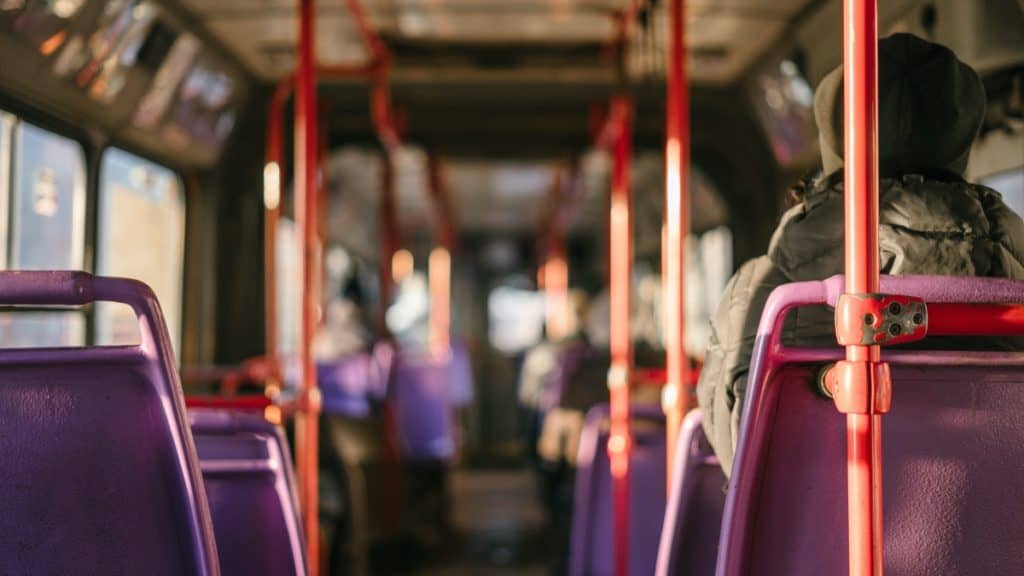
Enter your name and email in the form below and get a FREE Malta itinerary sent to your mailbox!
PIN IT!


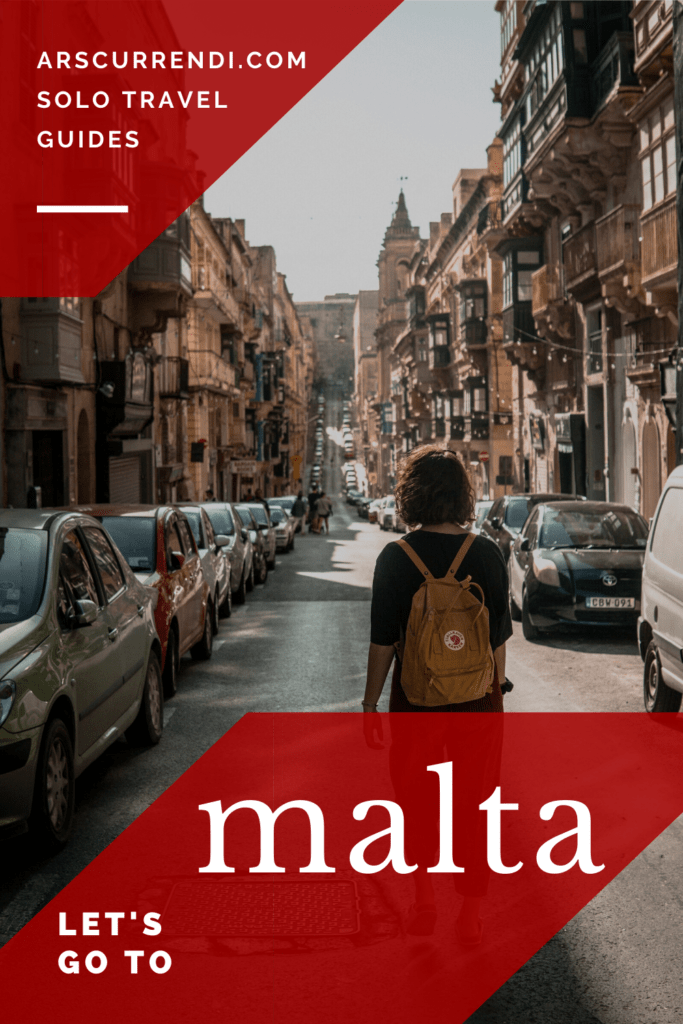
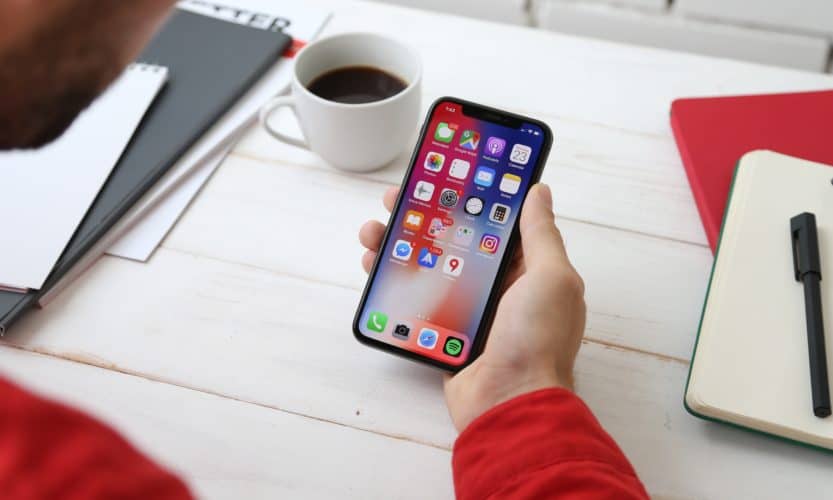
In 2020, technology is all around us. And that’s no different in the travel world. You can book everything online, you no longer need a physical boarding pass and you can read – or even listen to – books on your smartphone. That’s why I decided to compile a list with the 20 most useful apps for solo travellers that could genuinely change the way you travel in 2020.
The best part? All of these solo travel apps are free!
I divided the list into five categories:
Note: to ensure that I can continue creating content, I’ve decided to make it easier for you to donate to Ars Currendi. Just click the link or scan the QR code below. Thank you for your support!

Available on iOS and Android

Tourlina is an app for female solo travellers to find (female) travel companions based on mutual interests. The app works a bit like Tinder, but the website very clearly states that Tourlina is not a dating app.
This is also one of the reasons why this app is only available for women – research showed that having a male travel companion often leads to dating.
One of the advantages of Tourlina – beside the female-only aspect – is that you can connect with a travel buddy both during and before your trip.
Available on iOS and Android

Travello calls itself a social network for travellers. You can discover other travellers who are nearby and meet up with them, share travel photos and updates on your profile and join groups based on your interests.
Another fun part of this app is Travello Rewards: you’re rewarded with points for doing things on your trip and inviting people to join, and you can redeem these points by booking your next adventure through Travello.
Available on iOS and Android

A rather unique way of meeting people abroad is by using EatWith. This app offers dining experiences, cooking classes and food tours with locals.
Sharing food with locals in their own homes is a great way to discover and experience new cultures around the world, and apps like EatWith allow you to do just that.
Available on iOS and Android

Backpackr can be seen as an alternative to Travello. It’s a social network app for travellers (whether they are travelling alone or in a group).
Related: First Group Tour? Here Are 10 Things You Need To Know
One thing that sets Backpackr apart from other similar apps is the digital passport – you can collect virtual stamps to show off when you get back home.
Available on iOS and Android
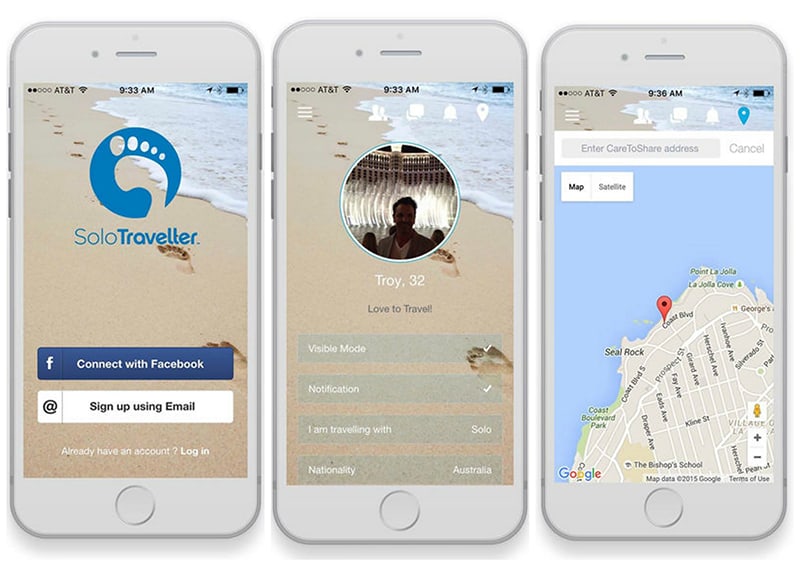
Another social networking app for solo travellers, SoloTraveller aims to give its users useful and up-to-date recommendations for bars, hotels, tours, and more.
And, of course, this app also helps you connect to travellers near you, using parameters like age, gender, interests and location.
Available on iOS and Android

Google Maps comes preinstalled on any Android phone and is an essential app for solo travellers.
When you’re travelling alone, it’s important to know where you’re going and how you’re going to get there. And, especially when you’re on the road, your internet connection isn’t always reliable. That’s when the offline maps on Google Maps (or alternatives like Maps.me) come in handy.
Available on iOS and Android
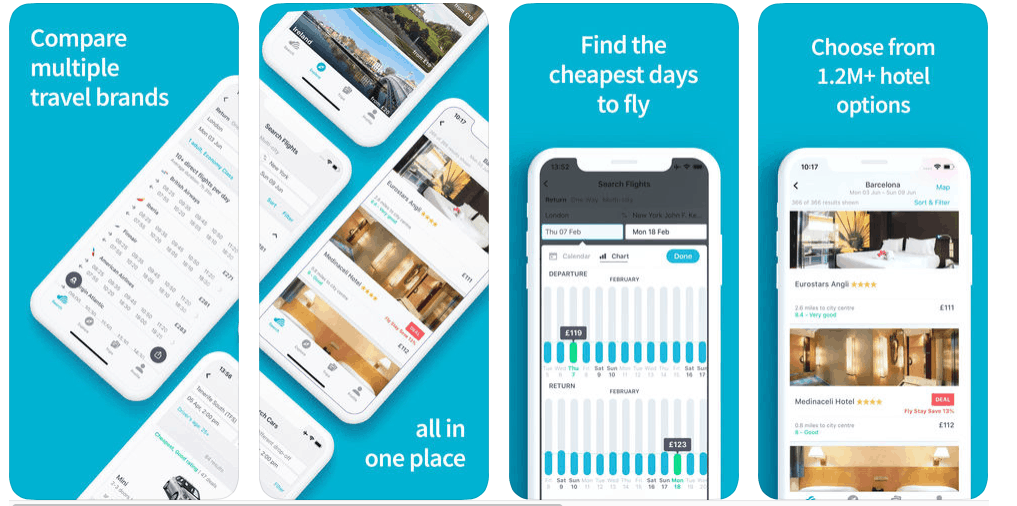
This is an especially useful app to book flights when you’re on a multi-destination trip, or just to book flights before you leave.
I personally find Skyscanner to have a friendlier interface and better deals than other flight apps (like Momondo, Cheapflights, Kayak and Expedia), but that essentially all comes down to personal preference.
Sometimes it’s easier to check bus schedules in an app than it is to try and figure everything out at the bus stop.
That’s why I recommend doing some research before leaving home and finding out which apps you might need to download to stay on top of the public transport situation.
In many countries, you can even purchase tickets through the app for bus, train and subway rides.
Available on iOS and Android

Hopper is another app that allows you to book flights and hotels while you’re on the go.
The big difference with other apps is that Hopper predicts prices and helps you book at just the right time to save the maximum amount of money.
Bonus: the interface is really pretty.
Available on iOS and Android

As a solo traveller, you might not have the budget to spend a lot of money on accommodation. That’s something for which Couchsurfing provides the solution.
To those who are unaware of this app: here’s what it does. Couchsurfing allows you to stay with a local for a certain number of nights for free.
So, really, it’s a win-win. You get a free place to stay and you get to meet locals. Hooray!
Available on iOS and Android

Airbnb is no longer the only alternative for expensive hotels, but it’s still one of the big players.
Nowadays, the app still offers short-term rentals, but it also shows off with exciting workshops and even multi-day adventures. In short, they’re now in the experience business.
One thing to keep in mind is that Airbnb rentals have been banned from some cities, like Santa Monica and Paris.
(I found a great stay on Malta through Airbnb and you can get up to €40 off your first booking by signing up through this link!)
Available on iOS and Android

Hostelworld is an essential app for the ‘traditional’ solo traveller. And, in this case, ‘traditional’ is by no means equal to ‘old-fashioned’.
Hostels are just a flawless accommodation option for solo travellers. Cheap beds, like-minded travellers and a vibrant atmosphere – what’s not to love?
After all these years, Hostelworld is still one of the best options out there to book hostel stays.
Available on iOS and Android

I only recently discovered Tripcoin, but now I pretty much use it for all of my solo trips.
Tripcoin is a travel budget and expense manager that allows you to see how much you actually spend on your trip.
You can see your expenses by day, by category and by country, and you don’t need an internet connection to log new expenses.
Available on iOS and Android

This renowned photo editor has been called ‘The world’s best editing tool’ countless times, and the best news is that the Lightroom app is completely free.
Sure, there are features that you can’t use on the free version, but I’ve personally found that the free app is more than enough to make your daily snaps look stunning.
Available on iOS and Android

Admittedly, FancyDays isn’t very useful when you’re actually on the road, unless you’re on a multi-destination trip.
But I personally think it’s a great app to build up the hype to your next adventure by counting down the days until you can leave.
There are plenty of countdown apps, but I’ve found this one to be the most aesthetically pleasing and to have the easiest interface to customise.
Available on iOS and Android

Google Translate is preinstalled on many Android devices, but it’s also one of those essential apps for solo travellers who use an iPhone.
The fun thing about the Google Translate app is that you can just take a picture of whatever you need to translate – a menu, a traffic sign, a folder – and the app will translate it for you.
Available on iOS and Android
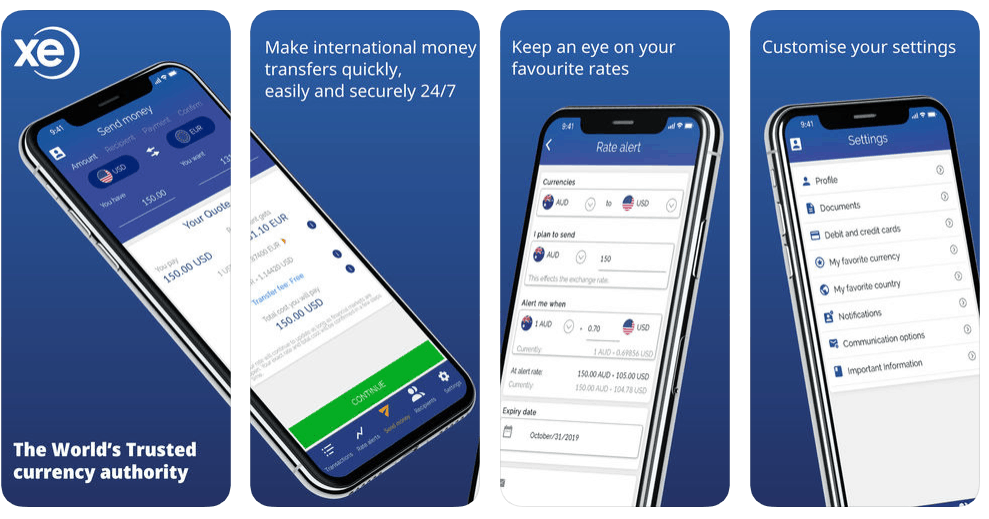
XE Currency, or any currency converter, for that matter, is a very useful app when you’re travelling alone.
It’s much more convenient to pop a number into the app and see it converted to the local currency than doing it with your calculator app and having to remember the exchange rate.
Besides, this app saves the last updated rates when offline, so you can also use it when you’re off the grid.
Available on iOS and Android

Yes, I know that geocaching is not only for travellers. But let’s be real: it’s great for travellers who aren’t sure what to do.
Geocaching is basically a big-ass treasure hunt. You try to find a geocache (usually a small container with a logbook inside) based on the map in the app and you write your name on the logbook.
Give it a try before you judge it. Because I know it sounds dorky and lame, but it’s actually a lot of fun.
Available on iOS and Android
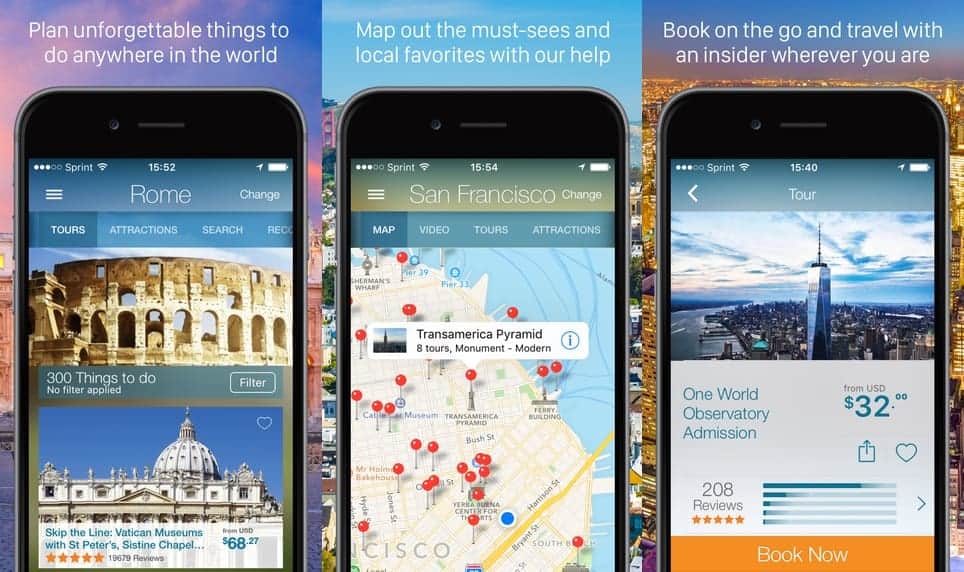
Viator is an app that makes it easy for travellers to find what they want. With great experiences and activities around the globe, Viator lets you plan in advance and skip the line.
You also get a lowest-price guarantee, a 24-hour cancellation policy, 24/7 multilingual customer service and a bunch of customer reviews to go off.
As a subsidiary of TripAdvisor, one of the biggest brands in travel, you can be sure that the people over at Viator know what they’re doing.
Available on iOS and Android

The Outbound operates according to similar principles as Viator, but it’s much more aimed at adventure travellers.
If you’re looking for a multi-day desert adventure, a snowshoe trip or a mountain hike, The Outbound is the only place to be.
Best of all? Many of the experiences that are posted on this app are free and have detailed descriptions of how to make it to the end of the hike.
They also have a database of lodges, basecamps and adventure hostels for your next adventure.
Well, there you have it.
My favourite apps for solo travellers to use in 2020.
While you’re planning your next solo trip – or while you’re already there – be sure to take a look at these apps to help you ease the process.
More useful links to help you plan your next solo trip:
PIN IT!



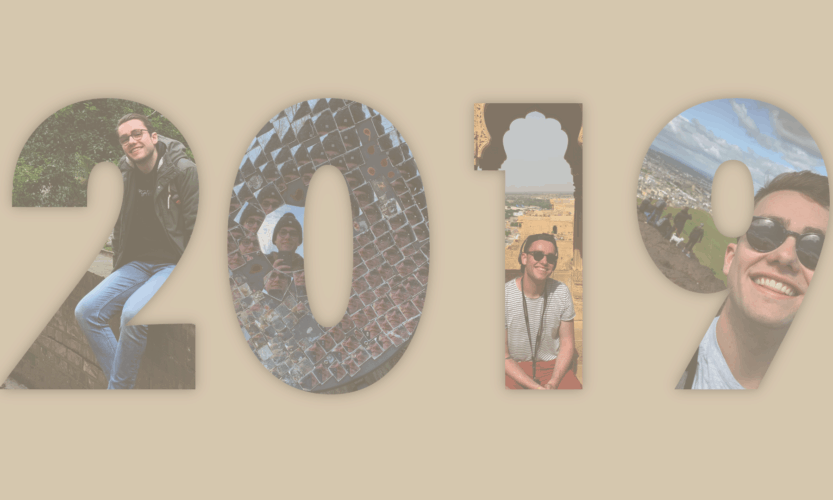
Yes, I know. I’m a few days late with this 2019 travel report.
It’s been a busy few weeks here in Belgium, but I couldn’t resist writing another article like the one I wrote last year. So here it is.
This is my 2019 travel overview.
Note: when I mention ‘blog post/video coming soon’, it might already be up and I forgot to update this post. So please take a look at my recent blog posts and my YouTube channel to stay up to date with all my content.
Note 2: to ensure that I can continue creating content, I’ve decided to make it easier for you to donate to Ars Currendi. Just click the link or scan the QR code below. Thank you for your support!

Click the links below to skip to the destinations you’re most interested in!

In February 2019, I took my third solo trip (after going to Berlin and Malta in 2017).
This time around, I went to the German capital Berlin (which is an awesome city for solo travellers, by the way).
I visited the Berlin essentials, like the DDR Museum, Brandenburger Tor and the Reichstag Building, on my first day. But after that, I went a bit more off-the-beaten-path. I went on a street art walking tour, hiked up a hill with a man-made Nazi station and explored an abandoned children’s hospital and an abandoned airport.
Video might be coming soon, but it might never come.
I’d say I’m sorry, but I don’t know if this video can deliver the quality that I want it to deliver.
All by myself, baby. It might seem strange to some of you, but I love travelling alone.
And, although there are plenty of reasons why solo travel sucks sometimes, I still think it’s one of the best ways to explore the world.
I went to Edinburgh in June to celebrate graduating from university.
So, we celebrated. (Pro tip: Dragonfly has the BEST cocktails.)
We also walked along the Royal Mile, took a ghost tour in Mary King’s Close, admired university buildings, climbed Arthur’s Seat and visited some museums, among other things.
Check the embedded map below to see more of what we did, ate and drank.
I’ll probably end up writing an article (or several articles) about Edinburgh in the near future.
I went to Edinburgh with my two best friends (@febelamkowski and @onanas_vandenameele).
Whelp. This is the big one.
In August, I went on a 3-week road trip in and around Rajasthan, India.
We definitely did too much to boil it all down to one paragraph, but I’ll try.
We admired countless palaces, forts and temples. After a wild camel ride, we slept in the desert. We zip-lined between hill forts and ridge tops. We took sleeper trains across the country. Indian ladies taught us to cook traditional Indian dishes. We went on a sunrise hike. We visited the Taj Mahal and the place where the Beatles spent three months. And, lastly, we took yoga classes and got Ayurvedic massages.
God, I want to go back.
I might write another article about India, but I’m not sure yet.
I went to India on a group tour, organised by Evelien from Joker (a Belgian travel agency).
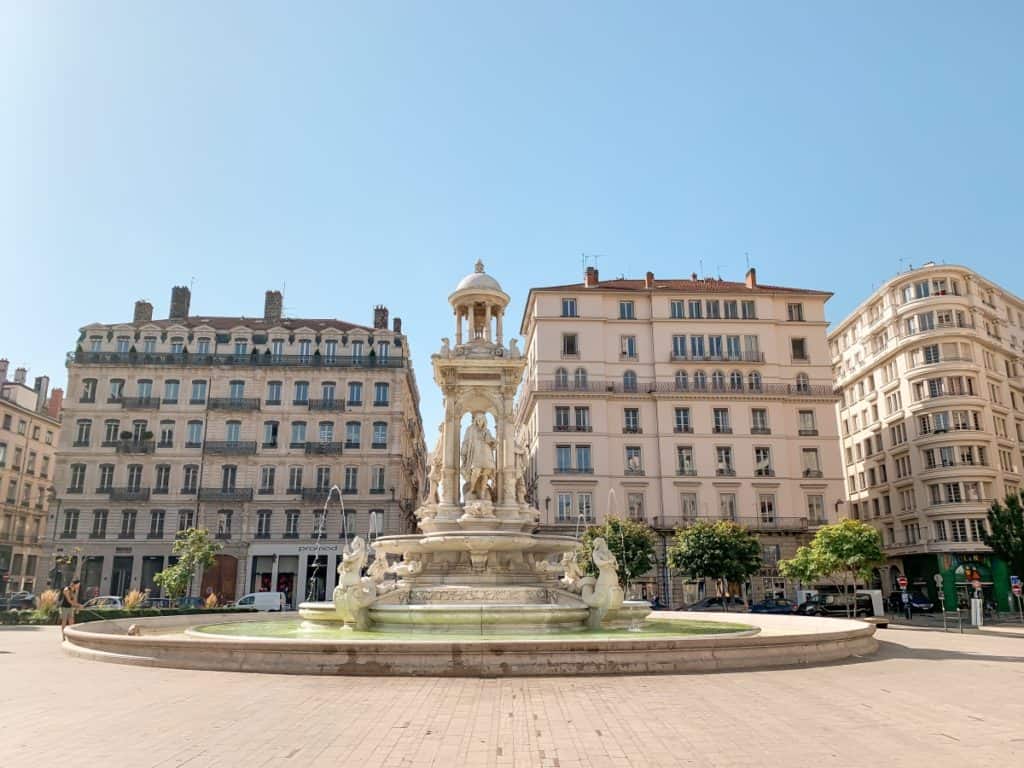
My last trip of this summer was a quick weekend getaway to Lyon. I was going on a trip with my mom, and I wanted to surprise her by planning everything. She only found out where we were going at the airport.
Fun fact: I was originally planning to go to Budapest with her, but a few weeks before the trip, our flights were cancelled for no apparent reason. I had to find an alternative, and I chose Lyon.
We mostly walked around the city without having a real plan, and it was great.
I won’t be making a video of this trip, because I don’t have enough suitable video footage.
I went to Lyon with my mom, as previously mentioned.
Since this wasn’t our first time in London, we decided to combine some of the must-sees – like Oxford Street, Hyde Park and Notting Hill – with some more obscure locations – like Southwark, St Dunstan in the East Church and Leadenhall Market.
It’s always been one of my big dreams to experience the Big Smoke around Christmas. And this year, I made it.
Article coming soon.
I went to London with my parents and my sister.
So, this was my 2019 travel report.
Now, that only leaves me with my current travel plans for 2020. And it’s going to be a big one.
For starters, I’m going skiing in France with my parents.
Next up is a Joker reunion (you know, those people I went to India with) in Bucharest, Romania.
That will be followed by a visit to two friends who are doing an internship in Pamplona, Spain.
In the summer of 2020, I’ll be going on a kayak trip to Sweden, a road trip through the south of Norway, a sibling trip to Snowdonia NP (Wales) and a surprise trip with srprs.me to top it all off.
If there’s one thing I’m sure of, it’s this: 2020 is going to be a good one.
Although I travelled less in 2019 than I did in 2018, the same message applies.
I didn’t write this to make anyone jealous of ‘how I’m able to do this’ or to rub my travels in your faces.
If anything, I did it to show you that — if travel is your priority — you can do it.
And also, I think I might make these travel reports an annual thing. They’re fun and easy to write, and they give you a quick overview of where I’ve been and where I’m going next.
Again, I know that I missed the mark by a few days. But hey, what can you do?
Catch you guys on the flippity flip!

Design by NXNW.